




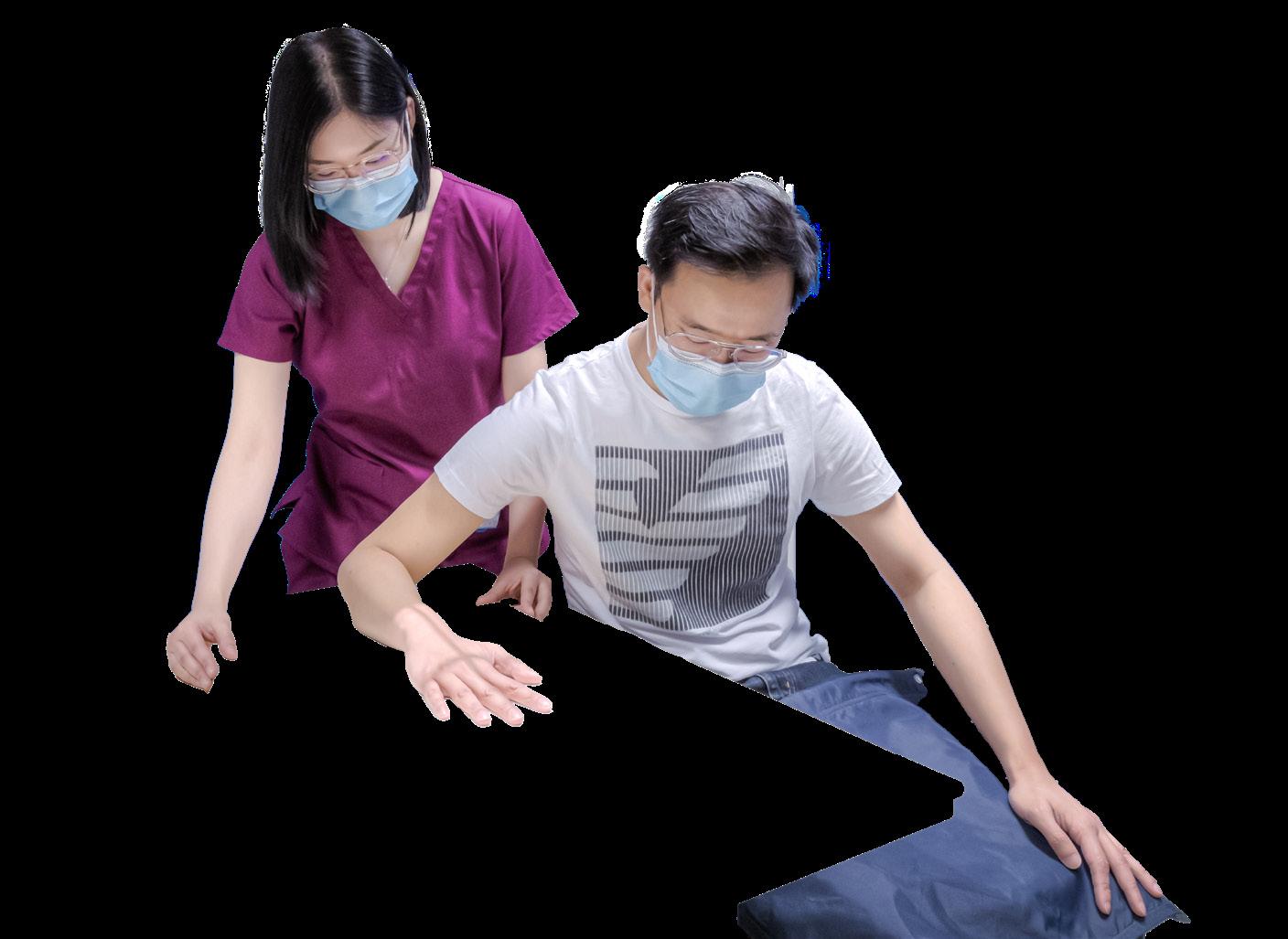
90% of Michener grads in 2023 work in their field of training in Ontario.
93% of Michener graduates passed their licensure exams in 2023.
490 healthcare professionals have graduated from Michener in 2023 and are now working in Ontario.
89% of graduates are satisfied with Michener preparing them for job success.
Over 50% of Michener grads are working in hospitals in Toronto and the GTA, and close to 30% were hired by the major hospital systems (UHN, Sinai Health, Sunnybrook, Unity Health, SickKids).
For more than 65 years, Michener has built a legacy of innovative programming that has prepared generations of health professionals for unique and in-demand healthcare careers — and an ability to evolve and respond to emerging health system priorities and the education needs of healthcare providers.
Today, we’re uniquely situated within University Health Network (UHN) in downtown Toronto, one of the largest and most highly ranked hospital systems in Canada and internationally. Our curriculum is informed by cuttingedge research and clinical innovations, giving Michener graduates an advantage as they begin their careers.
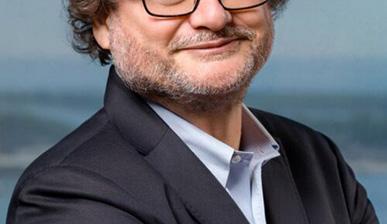

Dr. Harvey Weingarten
Principal, The Michener Institute of Education at UHN
The Michener Institute of Education at UHN welcomes you to a community of health professionals and leaders who bring the highest level of compassion and skill to their fields of practice. With a focus specifically on health professions and career-driven education that is integrated within the health system, our innovative programming means you’ll graduate at the top of your game.
We acknowledge the sacred land on which The Michener Institute is located today, which has been, and continues to be, the traditional territory of the Huron-Wendat, the Seneca and the Mississauga’s of the Credit River, among many other unnamed and unrecognized Indigenous communities. At this location, we stand on land protected by the Dish with One Spoon treaty between the Anishinaabe, Mississaugas and Haudenosaunee that bound them to share the territory and protect the land.
This meeting place is still home to many Indigenous peoples across Turtle Island, and we are grateful to have the opportunity to work and learn on this land.
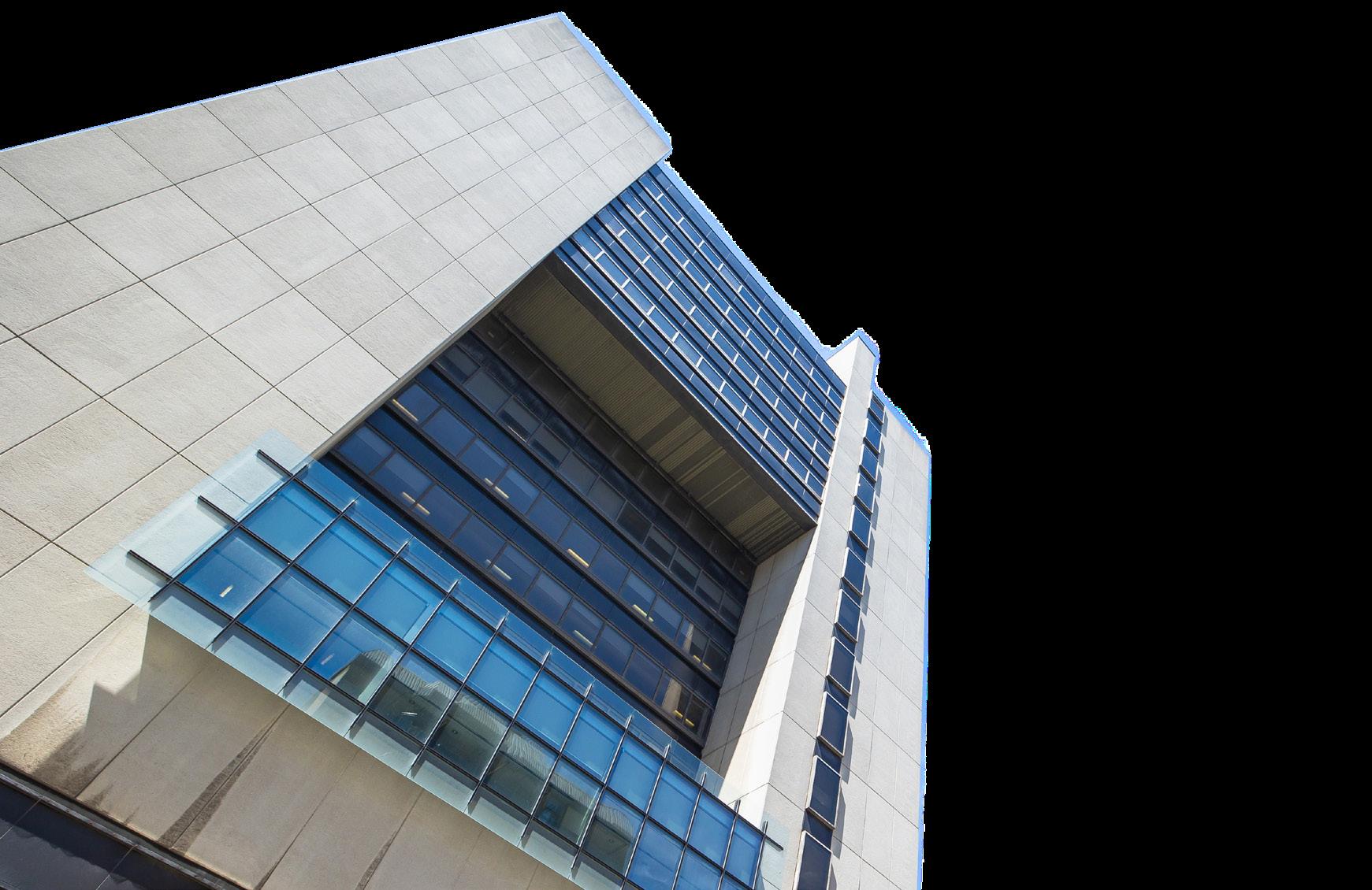
The Michener Institute is located in the heart of downtown Toronto, minutes from a network of world-renowned hospitals, clinics and research facilities. Part of University Health Network, Michener embeds a school within a hospital, giving direct access to real-time, front-line insight that informs and shapes its curricula.
Boasting a vertical campus made up of 14 floors of state-of-the-art labs, learning and simulation spaces, the Michener campus is a hub of experiential education.
Michener houses a gym, fitness and recreation facilities, and is located a short walk from some of the most exciting attractions, restaurants, museums and galleries that Toronto has to offer.

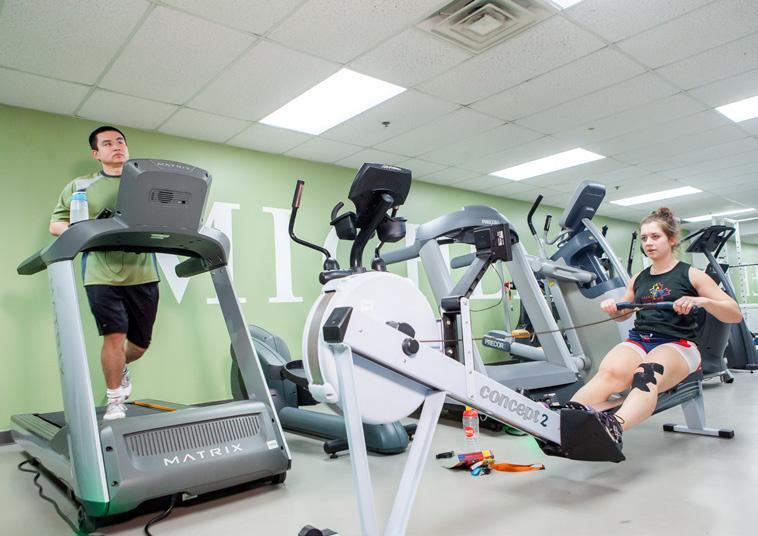
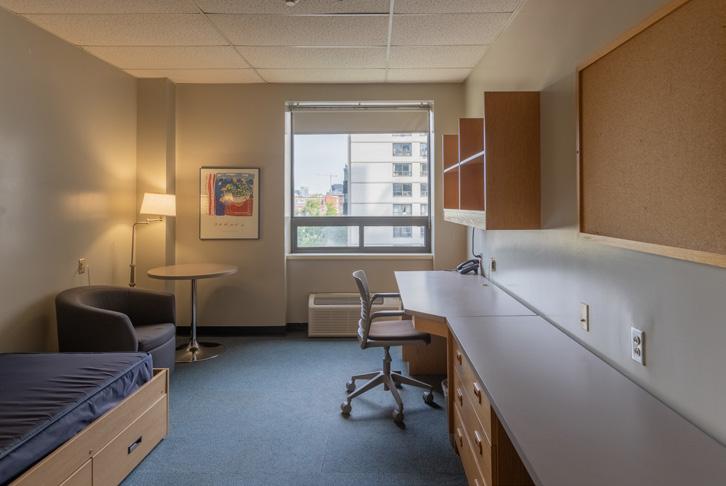


Immerse yourself in campus life and join a community of Michener students, alumni and colleagues who will be with you every step of the way.
Michener’s Student Success Network is here to help you navigate your experience at Michener with a range of services to support your journey both in and out of the classroom.
For students with a documented accessibility or accommodation need, we’re here to help make arrangements, including in-class, lab and exam accommodations.
Bring your resume and meet employers at the Michener Career Fair. Open to all Michener students each spring, the Career Fair is your chance to discover the next step in your healthcare career.
This free, confidential service is available to help you navigate stressful life events, academic challenges and career coaching.
Health Services is committed to helping students fulfill entry and clinical health requirements. Whether you are in your first year or about to go for clinical placement, you can connect with Health Services for guidance on health requirements such as immunization, mask fitting, vaccines and many more.
Schatz Hall is an affordable, safe and convenient choice for living in the heart of downtown.
• Co-ed residence located directly on campus.
• Fully-furnished single rooms and private bathrooms.
• Onsite library, study, fitness, recreation and common spaces.
• 24-hour security.
• Priority is given to first-year students living greater than 100km from Michener.
If you need extra support, peer tutors are available to help you in specific subject areas and to develop learning strategies throughout the academic year.
No matter your interests, there’s a student group for you. Take advantage of our on-campus fitness, athletics and recreation facilities, or join a student club, such as student diversity and inclusion groups, Charity Committee, Student Council and more.
I still remember how ecstatic I was two years ago when I received my acceptance for the Respiratory Therapy program at Michener. I have always had a passion for helping people and making a positive impact on their lives, which is why I chose Respiratory Therapy – I wanted to improve the quality of life for someone in need by giving them the ability to breathe easier.
That passion to help also fuelled my desire this year to run for Michener’s Student Council President, a role that allows me to collaborate with students, staff and faculty to foster a positive environment for everyone.
I have found that getting involved at Michener is the way to make the most of your experience here, and there are plenty of opportunities available to you. I joined Michener’s Student Council, became a member of Michener’s Alumni Association and volunteered at various Michener events, such as convocation, the college fair and many others.
Through my roles in these clubs and events, as well as living in residence, I have built everlasting relationships and developed invaluable skills for my career. Michener is a great place to pursue your ambitions in healthcare and make meaningful connections along the way.
Zaeem Qureshi
Respiratory Therapy ‘25



Clinical education is central to all of Michener’s full-time and part-time programs. With clinical partners located across Canada, you’ll gain hands-on, experiential training everywhere from academic and community hospitals to private laboratories, clinics and community health centres. Working under the guidance of clinical supervisors and educators, you’ll have the opportunity to interact directly with patients, and use the latest diagnostic and patient care equipment and technology that you’ll encounter in the field.
Our clinical education is accompanied by a robust simulation curriculum that enables you to hone your clinical skills in a safe environment before embarking on a clinical placement. Before beginning your formal clinical training, you’ll learn in our state-of-the-art simulation suites that create highly realistic, patient-centred scenarios and interactions.

The importance of being open to opportunities
Fraser describes her academic pursuits as a ‘jack-of-all-trades’ style, but when she ultimately decided on medicine over English she knew a future as a doctor was not in the cards.
“I came out of my undergrad pretty aware that being a doctor wouldn’t be well suited to my personality,” Eryl says, “so I started looking at other avenues.”
Eryl says when she found Michener and discovered the Medical Laboratory Sciences program, she was intrigued by the many opportunities it presented to work in a non-patient facing role in a hospital.
“When I realized there were five different disciplines you could go through the program, I felt like I was still leaving the door open to different avenues,” she says.
Her adventurous nature led her to join Michener’s Alumni Association in her firstyear as a student. “I didn’t know a lot about the actual role I was signed up to do, and found the meetings far more organized than the way a student council runs meetings,” she says.
“But it was such a passionate, engaged group of individuals that I came in and never left. When I graduated, I stayed on as an alumni member.”
Ten years later, now a Senior Medical Laboratory Technologist at Trillium Health Partners, she assumed the role of Chair of Michener’s Alumni Association.
Eryl says she would have never expected to end up in this position, and she encourages the next wave of health professionals to take a chance themselves to see where it leads.
“Sometimes people are hesitant to say yes to those opportunities because of the fear of the unknown, you don’t know what you’re stepping into,” she says, “but there is such a beauty in taking that leap of faith and then finding out where you end up.”


The Michener Institute has a variety of pathways for full-time or part-time degrees, diplomas and certificates across our program offerings
MASTER’S DEGREE (full-time, two years)
Michener offers Canada’s first and only Master of Science degree program in Cardiovascular Perfusion. Entry to this program requires completion of a bachelor’s degree for admission and provides pathways towards doctorallevel programs.
ADVANCED DIPLOMA (full-time, two or three years)
Advanced diploma programs prepare students for real-life healthcare scenarios. In addition to foundational coursework, our advanced diploma programs provide robust practical experience through simulation and clinical placements over a span of two to three semesters.
Entry to the advanced diploma programs may require completion of high school and/or post-secondary studies.
• Cardiovascular Perfusion
GRADUATE CERTIFICATE (part-time, one and a half or two years)
Graduate certificate programs at Michener offer healthcare professionals the ability to pursue specializations in a related discipline to their field of practice.
Entry to the graduate certificate programs require completion of post-secondary education and work experience in select regulated healthcare professions.
CERTIFICATE (part-time, one semester or more)
Our Continuing Education certificate programs caters to healthcare professionals who would like to expand their skills and upgrade their knowledge. Certificate programs usually run for one to two semesters depending on the field of study.
Applicants must have relevant clinical work experience to qualify for admission.
• Chiropody
• Diagnostic Cytology
• Genetics Technology
• Medical Laboratory Science
• Magnetic Resonance Imaging (1st Discipline)
• Nuclear Medicine & Molecular Imaging Technology*
• Radiation Therapy*
• Radiological Technology*
• Respiratory Therapy
• Ultrasound
* joint Bachelor of Science program with University of Toronto
• Anesthesia Assistant
• Digital Health & Data Analytics
• Magnetic Resonance Imaging (For Imaging Professionals)
Visit michener.ca/ce for a full list of our Continuing Education certificate programs.
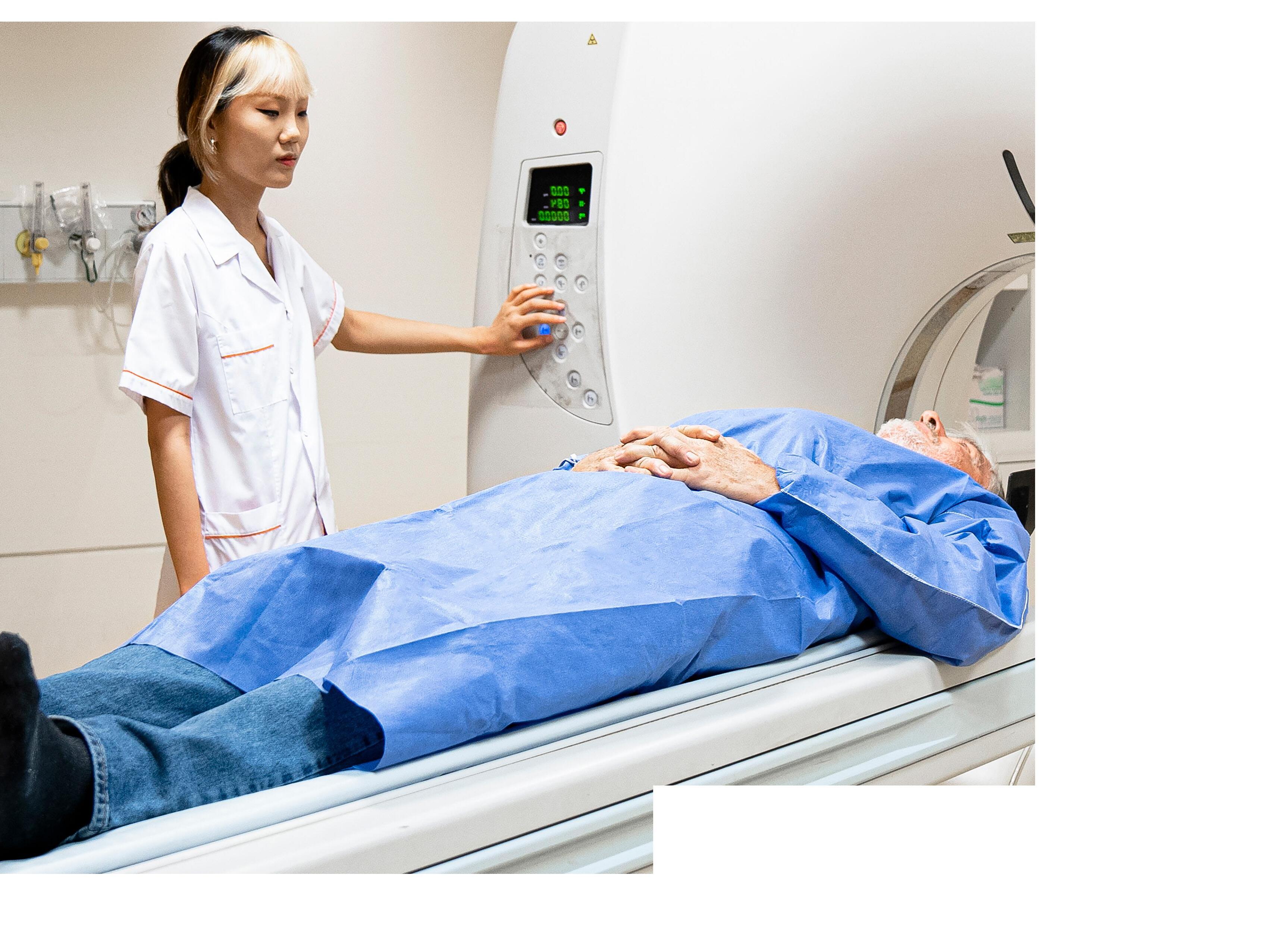

Using their knowledge of anatomy, physiology and pathology — along with magnetic resonance imaging (MRI) physics and methods — MRI technologists operate MRI scanners to create images of patients’ bodies, which physicians use as an aid for the diagnosis of injury and disease.
Michener’s MRI 1st Discipline program is a full-time, hybrid program open to students directly out of high school. You’ll be trained to provide effective and compassionate care for patients while carrying out diagnostic medical imaging procedures. Through this program, you’ll be encouraged to develop the necessary technical, critical-thinking and problem-solving skills to complete and adapt MRI procedures based on a patient’s medical condition.
MRI technologists can work in clinical environments such as hospitals, mobile magnetic resonance units and diagnostic imaging centres. Other career opportunities can be found in health informatics, digital health education, sales, applications and research.
Credential Earned Advanced Diploma
Application Deadline February 1, 2025
Program Length 2 years full-time
Program Delivery Hybrid
Start Date September 2025
Clinical Placement 30 weeks
ADMISSION REQUIREMENTS
A) One year of post-secondary studies (university):
• A minimum of one year of undergraduate studies at a recognized university (30 credits OR 5.0 full-course equivalents) with a minimum 70% cumulative GPA (CGPA)
• First-year biology (one semester)
• Any first-year mathematics course (one semester)
OR
B) Completion of a pre-health sciences pathway to advanced diplomas and degrees (colleges):
• Minimum 75% cumulative GPA (CGPA)

OR
C) Direct from high school
• Completion of an Ontario Secondary School Diploma or equivalent
• Minimum 85% overall Grade 12 average (top 6 Grade 12 U subjects)
• English: ENG4U
• Biology: SBI4U (minimum 85%)
• Any grade 12 mathematics U course (minimum 85%)
All applicants are required to complete the CASPer assessment. Visit michener.ca/admissions for more information.
Graduates from this program may require licensure or certification to work in the profession. Visit michener.ca for more information.
SAMPLE FIRST-YEAR COURSES†
Semester 1
• Human Anatomy & Physiology I
• Professional Practice in MRI I
• Applied Physics for MRI
• Patient Care in Medical Radiation Sciences I
Semester 2
• Professional Practice in MRI II
• Integrated MRI Procedures I
• Imaging in the Healthcare System
• Radiographic Physics and Radiobiology
• Patient Care in Medical Radiation Sciences II
†First-year courses are subject to change.
“This program is really interesting because it combines various aspects of healthcare and technology, and with technology evolving every day you’re always learning something new.”
Kamjeet P. MRI 1st Discipline student

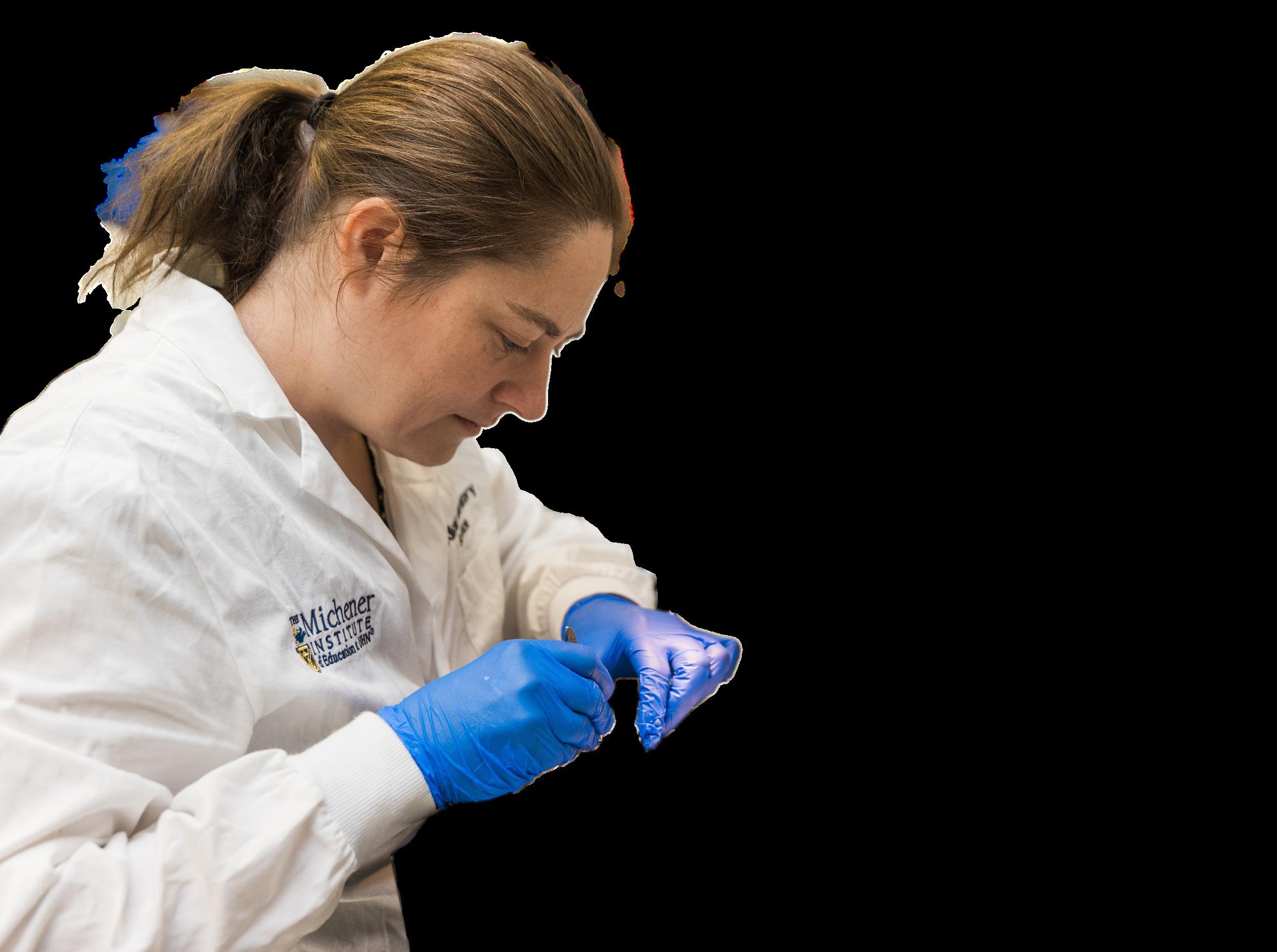
Medical laboratory technologists are central to the health system. Often working behind the scenes, they perform lab analyses and complex procedures on tissue specimens, blood samples and other body fluids. These lab results are then used by physicians to diagnose and treat patients, and monitor and prevent disease.
Michener’s labs are outfitted with the latest equipment, so you’ll learn on a variety of automated lab analyzers, highquality microscopes, double and five-headed microscopes and augmented digital technology.
• Hospital or private laboratories
• Canadian Blood Services
• Consulting, Sales and Marketing, Technical Support
• Public Health/Infection Control
• Quality Assurance/Total Quality Improvement
• Supervision/Administration/Management or Education
• Research and Product Development, Laboratory Information Systems
SAMPLE FIRST-YEAR COURSES†
• Normal Microanatomy
• Clinical Chemistry I
• Introduction to Hematology
• Introduction to Microbiology
• Physiology and Pathophysiology
• Specimen Procurement
• Foundations of Interprofessional Collaboration for Medical Laboratory Technology Programs
• Hematology and Hemostasis
• Introduction to Histotechnology
• Clinical Instrumentation
• Applied Microbiology
• Molecular Diagnostics
†First-year courses are subject to change.

Credential Earned Advanced Diploma
Application Deadline February 1, 2025
Program Length 3 years full-time
Program Delivery Hybrid
Start Date September 2025
Clinical Placement 20 weeks
Completion of Ontario Secondary School Diploma (OSSD) or equivalent
Minimum overall Grade 12 average of 70% (top Grade 12 U or C subjects)
Minimum grade of 70% on the following pre-requisite courses:
• Grade 12 English, C or U level, or equivalent
• Grade 12 Math, C or U level, or equivalent
• Grade 12 Chemistry, C or U level, or equivalent
• Grade 11 or 12 Biology, C or U level, or equivalent
Admission requirements may be met by completing a Pre-Health Sciences Pathway to Advanced Diplomas and Degrees certificate, or equivalent courses offered by Colleges and Universities.
Graduates from this program may require licensure or certification to work in the profession. Visit michener.ca for more information.

Anew, flexible online learning option is available to Nova Scotians who want to become medical laboratory technologists, created through the province’s partnership with Michener.
“Medical laboratory technology is a rewarding career that is in high demand right now,” said Brian Wong, Nova Scotia’s Minister of Advanced Education. “This learning model will allow students to learn online and practise in person at Nova Scotia Health facilities throughout the province so we can meet critical labour needs and train the professionals we need to provide Nova Scotians with access to better and faster care.”
Learners in the new program sign a return of service agreement for a position with Nova Scotia Health.
Another program through Michener has helped five internationally trained medical laboratory technologists get ready to work in Nova Scotia. These MLTs completed a 16-week bridging program to prepare for their licensing exam, which included work with conditional licences to help fill critical labour needs at Nova Scotia Health.
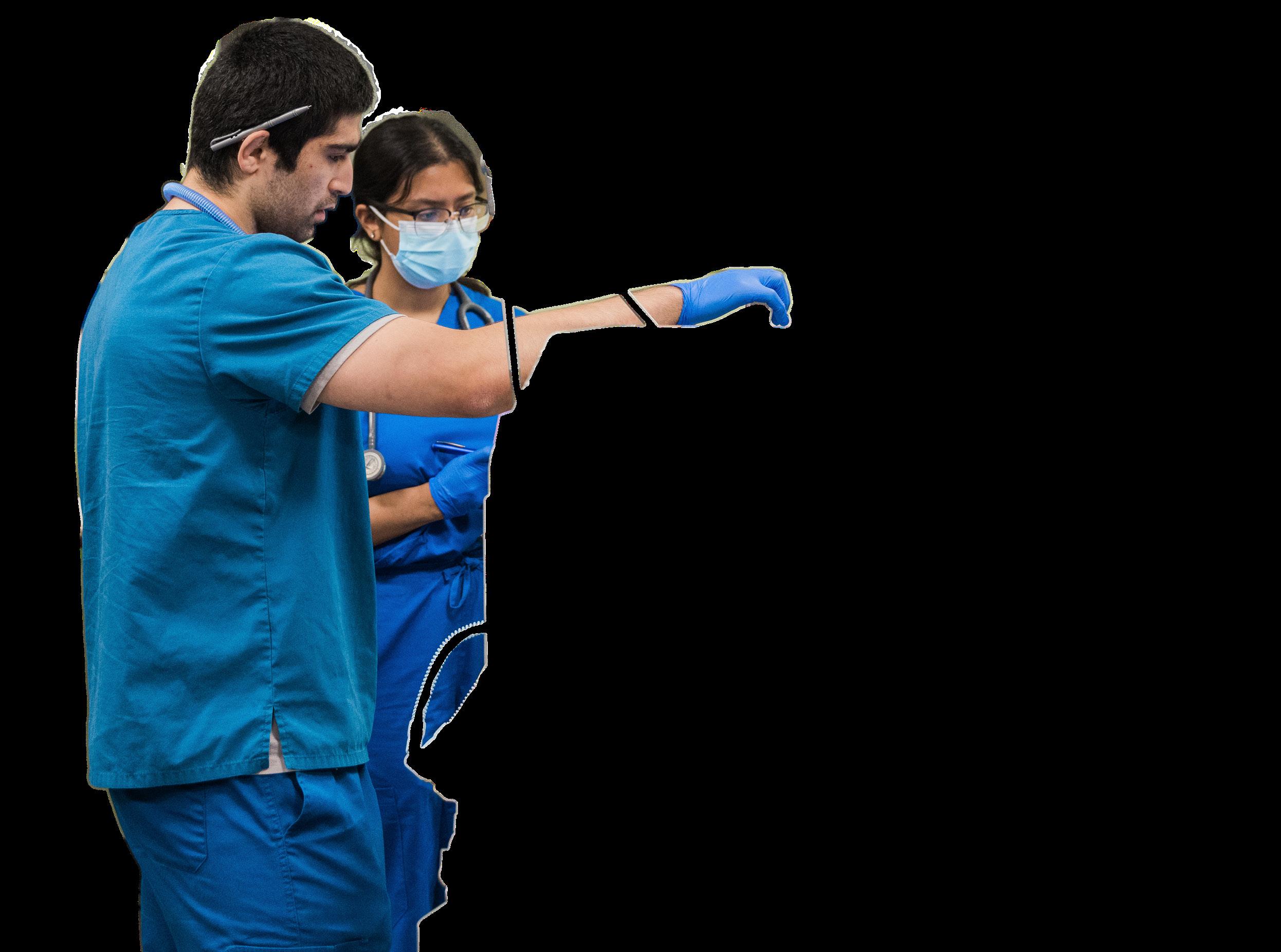

Respiratory therapists support patients whose ability to breathe has been compromised due to trauma or acute care needs, or because of disease and other health conditions. As a respiratory therapist, you’ll be part of a large, interdisciplinary health team that provides life-saving care to patients during critical illness or injury, through to rehabilitation.
From day one at Michener, you’ll have full access to practice labs outfitted with the most advanced respiratory therapy equipment, and lab and simulation activities that mirror the clinical realities you’ll see in the field.
Providing care to adults, children and newborns, you can work in hospital critical care units, emergency departments, operating rooms, diagnostic testing laboratories, rehabilitation programs and asthma clinics, home care and pharmaceutical or medical equipment sales
SAMPLE FIRST-YEAR COURSES†
• Human Anatomy & Physiology I
• Basic Professional Skills
• Cardiovascular Diagnostics
• Respiratory Care Procedures I Semester 2
• Basic Airway Management
• Cardio-pulmonary Physiology
• Pulmonary Diagnostics
• Respiratory Care Procedures III
• Pulmonary Ventilation I
• Respiratory Care Procedures II †First-year courses are subject to change.
Credential Earned Advanced Diploma
Application Deadline February 1, 2025
Program Length 3 years full-time
Program Delivery Hybrid
Start Date September 2025
Clinical Placement 31 weeks
Secondary school diploma with a minimum cumulative GPA (CGPA) of 75% and a minimum grade of 70% in each of the following prerequisite courses:
• English: ENG4U
• Mathematics: Any grade 12 4U level course
• Chemistry: SCH4U
• Biology: SBI4U
• Physics (Grade 11 or 12): SPH3U or SPH4U
• One additional Grade 12 U or U/M level course
Post-secondary courses may be used to satisfy subject prerequisites. Applicants with post- secondary education must provide official transcripts for all secondary and post-secondary institutions attended. The academic minimums on the post-secondary record are 65% in each subject prerequisite and a cumulative GPA of 2.70 (70%) on the OMSAS* scale.
All applicants are required to complete the CASPer assessment. Visit michener.ca/ admissions for more information.
Graduates from this program may require licensure or certification to work in the profession. Visit michener.ca for more information.
*Visit ouac.on.ca for Ontario Medical schools grade conversion.

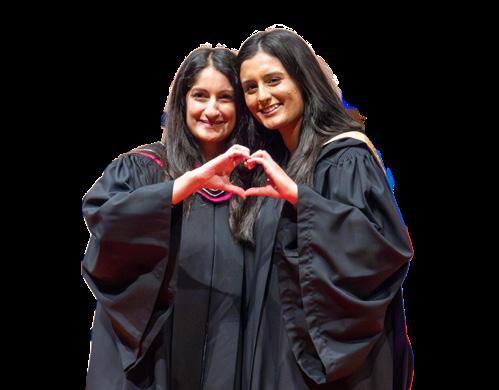
From an early age, Richa Sharma watched a number of close family members go through medical emergencies. Those experiences became the driving force for the Class of 2024 Valedictorian and 2024 President’s Scholarship winner.
“Thinking back on my personal history has always served as a great motivator to excel and succeed,” says Richa, a new graduate of the Respiratory Therapy program.
“It’s not just about my expertise as a clinician, having been through so many tough situations myself it’s about being truly empathetic for people in those moments.”
Following complications during his birth, Richa’s younger brother had his life saved thanks to critical assistance from the Acute Care Transport Service (ACTS) at The Hospital for Sick Children. She still remembers watching the respiratory therapist perform treatment within the hospital and throughout her brother’s recovery.
The experience would fundamentally shape Richa’s future.
“When my brother was born, he suffered from a bad case of meconium aspiration and required a long resuscitation,” she says. “They warned us that he wasn’t going to make it, but the ACTS team came in and rescued him.”
Following graduation, Richa became a respiratory therapist at SickKids Hospital, with hopes of joining the ACTS team herself in the future – a path she felt destined to take because of all they did for her brother and family.
“It’s kind of my way to pay it forward,” she says.
She also joined the team at Sunnybrook Hospital as a respiratory therapist.
Michener was the top choice for Richa’s pursuit of healthcare thanks to the reputation and bridging opportunities provided by the courses and programs.
Her advice to those considering Michener is to take advantage of the learning opportunities and supports provided.
“Everyone is like-minded and geared towards the same goal,” she says. “Keep persevering and you are able to bear fruit.”


As a cardiovascular perfusionist, you’ll control the equipment that manages heart and lung function of patients in the operating room. From open-heart surgeries to lung transplants, you’ll work with surgeons, anesthesiologist and nurses on an interprofessional operating room team.
The only Master’s level Cardiovascular Perfusion program offered in Canada, this program includes robust training on state-of-the-art heart-lung machines you’ll encounter in the operating room, principles of pharmacology and hemotherapy, as well as applied research opportunities through the completion of a capstone project.
Cardiovascular Perfusionists work in hospitals that have cardiac surgery programs. The majority of their time is spent in the cardiac operating room, but they also work in other critical care areas such as the ICU and Cath Lab. Other unique career opportunities can be found in transplant programs, education, commercial sales and research.
SAMPLE FIRST-YEAR COURSES†
Semester 1
• Hemotherapy
• Patient Care and Professionalism
• Physiological Science I
• Perfusion Theory I (30 hours allotted to hospitalbased observations)
Semester 2
• Professional Practice
• Applied Pharmacology
• Pathophysiology
• Perfusion Theory II (6 hours per week allotted to hospital-based observations)
• Research Method
†First-year courses are subject to change.
Credential Earned Master of Science Degree
Application Deadline February 1, 2025
Program Length 2 years full-time
Program Delivery Hybrid Start Date September 2025
Clinical Placement 32 weeks

A) Bachelor of Science with a cumulative GPA (CGPA) of 3.0 on the OMSAS* scale and a minimum grade of 70% (B-) in each of the following one-semester (0.5 credit) university-level courses:
• Gross Human Anatomy‡
• Gross Human Physiology‡
• Algebra or Calculus
• General Physics OR
• Chemistry
B) Bachelor of Science with a minimum cumulative GPA (CGPA) of 3.0 on the OMSAS* scale and:
• Registered Respiratory Therapist (RRT) or Registered Nurse (RN)
• One-year critical care experience within the last 5 years
All applicants are required to submit an Applicant Experience Checklist, Letter of Intent, at least one Letter of Recommendation (academic or professional) and complete the CASPer assessment. Visit michener.ca/admissions-requirements for the checklist, CASPer test dates and additional admission information. Graduates from this program may require licensure or certification to work in the profession. Visit michener.ca for more information.
‡ Michener’s continuing education course Gross Human Anatomy & Physiology (AP807) can fulfill the Gross Human Anatomy & Gross Human Physiology requirements
*Visit ouac.on.ca for Ontario Medical Schools grade conversion

“No two cases are ever the same, perfusion constantly pushes you to learn and adapt, and also provides you a chance to be part of a critical team that impacts patient care.”
Enas N. Cardiovascular Perfusionist Student


As primary care providers, chiropodists are specialized in the prevention and treatment of conditions, dysfunctions and diseases related to the feet. From treating diabetes and ulcers, to sports and traumatic injuries, chiropodists can help patients improve their general health, wellbeing and quality of life.
Offering the only English-language chiropody program in Canada, Michener is also home to an onsite chiropody clinic that provides students with the opportunity to treat patients under the supervision of the program’s faculty made up of licensed chiropodists.
Chiropodists work in a wide range of settings, including community health centres, family health teams, long-term care facilities, hospitals, sports teams and in private practice
SAMPLE FIRST-YEAR COURSES†
• Lower Extremity Anatomy Dissection
• Structure and Function of the Lower Limb
• Dermatology
• Foundations of Professional Practice
• Pathophysiology I
• Podiatric Medicine I
• Podiatric Biomechanics I
• Podiatric Clinical Practice
• Pathophysiology II
• Clinical Pharmacology
• Podiatric Medicine II
†First-year courses are subject to change.
Credential Earned Advanced Diploma
Application Deadline February 1, 2025
Program Length 3 years full-time
Program Delivery Hybrid
Start Date September 2025
Clinical Placement 30 weeks
ADMISSION REQUIREMENTS
Bachelor of Science degree in a health sciences field or a Bachelor of Science/ Arts degree in Kinesiology with a minimum cumulative GPA (CGPA) of 2.70 on the OMSAS scale* and a minimum grade of 70% in each of the following university-level courses:
• Human Anatomy (1 semester, 0.5 credit)
• Human Physiology (2 semesters, 1.0 credit)
All applicants are required to complete the CASPer assessment. Visit michener.ca/ admissions for more information. Graduates from this program may require licensure or certification to work in the profession. Visit michener.ca for more information.
*Visit ouac.on.ca for Ontario Medical schools grade conversion.
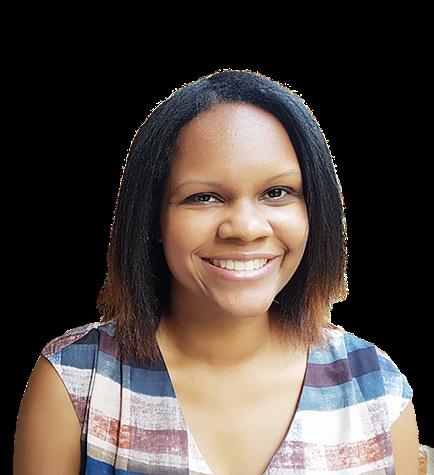
Tobi Mark, chiropodists are healthcare supercollaborators, as she says optimal patient care during a time of immense strain on the healthcare system is only possible through teamwork.
“I work with many people living with diabetes who, unfortunately, have developed a foot ulcer or open wound, which can take significant time to heal,” says Tobi. “To succeed, we need sustained collaboration not only between physicians, nurses, and other healthcare professionals, but also our patients, their families and caregivers.”
Following graduation from Michener, she worked at St. Michael’s Hospital before receiving an opportunity to work abroad in Bermuda at a private practice. She helped establish a new, multi-disciplinary foot wound clinic, a groundbreaking development for Bermuda at the time.
Upon returning to Canada she worked at Mississauga Halton Diabetes Foot Care program and Halton Healthcare and Women’s College Hospital before becoming an Associate Professor of Chiropody at Michener.
She teaches her students to take ownership of patient cases, communicate with patients and integrate their learned knowledge to help their patients heal from complications with a sense of independence.
“My education changed my life and gave me purpose,” she says. “I would not be where I am today without Michener.”
Tobi says her goal now is to bridge the gaps in foot care and foot wound care through the collaborative approach that has carried her throughout her career.
“Having a foot wound is physically, mentally, and emotionally taxing on our patients, cases can be devastating and completely change someone’s life,” she says. “But if we meet our patients where they are at, educate them and work with them, we can be right beside them on their journey, hopefully to healing.”


Develop the skills to detect and diagnose precancerous cellular changes, various types of cancers, and clinically significant infections. As a student in one of the few Diagnostic Cytology programs in Canada, you’ll play a vital role in the fight against cancer by analyzing specimen slides from pap smears, lungs, bladder, lymph nodes, thyroid, and other body parts. Your expertise will support pathologists in making accurate patient diagnoses.
Most cytotechnologists work in hospitals or community laboratories, but they may also find employment in areas such as laboratory management, research, education, sales, marketing and technical consulting.
• Gynecologic Theory
• Molecular Theory
• Microanatomy and Histotechnique I
• Pathology I
• Foundations of Interprofessional Collaboration for Medical Laboratory Technology Programs
• Medical Diagnostics
• Microanatomy and Histotechnology
• Non-Gynecologic Cytology
• Pathology II
†First-year courses are subject to change.
Credential Earned Advanced Diploma
Application Deadline February 1, 2025
Program Length 2 years full-time
Program Delivery Hybrid
Start Date September 2025
Clinical Placement 24 weeks
ADMISSION REQUIREMENTS
A) Bachelor of Science degree with a minimum 70% (B-) average and 70% (B-) average in the following university level courses:
• Human Anatomy – 0.5 credit (one term or semester)†
• Human Physiology – 0.5 credit (one term or semester)†

B) Canadian certified Medical Laboratory Technologist (MLT) with a degree or diploma with a minimum overall average of 70% (B-)
† Michener’s online distance-education course Anatomy and Physiology for Healthcare Professionals (AP601) can fulfill the Human Anatomy & Human Physiology prerequisites. OR
Graduates from this program may require licensure or certification to work in the profession. Visit michener.ca for more information.


“Something that I’ve always looked for in a career is an area where I’m always going to learn. That’s why I think this program is very fulfilling, both in that I’ll feel like I have a purpose in diagnosing cancer and that I’ll continuously be learning throughout my career.”
Liam S. Diagnostic Cytology Student

Join one of the most rapidly evolving fields of healthcare. As new discoveries advance scientific knowledge, genetics technologists are on the cutting edge of the latest tests — many still in development — for diagnosing a wide variety of genetic disorders and certain cancers.
Whether you’re testing chromosomes (cytogenetics) or analyzing DNA and RNA (molecular genetics), your training will include a range of techniques, instrumentation and analytical software – from microscopes to the latest genomic analyzers.
Genetics technologists work in a variety of settings including hospitals, private and public research laboratories and academic facilities.
SAMPLE FIRST-YEAR COURSES†
Semester 1
• Cytogenetics Theory & Techniques I
• Molecular Genetics Theory & Techniques I
Semester 2
• Foundations of Interprofessional Collaboration for Medical Laboratory Technology Programs
• Cytogenetics Theory & Techniques II
• Molecular Genetics Theory & Techniques II
†First-year courses are subject to change.
Credential Earned Advanced Diploma
Application Deadline February 1, 2025
Program Length 2 years full-time
Program Delivery Hybrid
Start Date September 2025
Clinical Placement 18 weeks
ADMISSION REQUIREMENTS
A) Bachelor of Science with a minimum cumulative GPA (CGPA) of 3.0 on the OMSAS* scale and a minimum grade of 70% in each of the following university-level courses completed within the last 10 years:
• 0.5 credit in Human Genetics (one-semester course)†
• 0.5 credit in Molecular Genetics (one-semester course)†
OR

B) Canadian certified medical laboratory technologist with a degree or diploma and a minimum cumulative GPA (CGPA) of 3.0 on the OMSAS* scale, and a minimum grade of 70% in each of the following university-level courses completed within the last 10 years:
• 0.5 credit in Human Genetics (one-semester course)†
• 0.5 credit in Molecular Genetics (one-semester course)†
All applicants are required to submit an Applicant Experience Checklist and complete the CASPer assessment. Visit michener.ca/admissions for more information.
Graduates from this program may require licensure or certification to work in the profession. Visit michener.ca for more information.
*Visit ouac.on.ca for Ontario Medical schools grade conversion.
†Michener’s Human Genetics (HGCE110) and Michener’s Molecular Genetics (MGCE110) courses fulfill the Human and Molecular Genetics requirements.
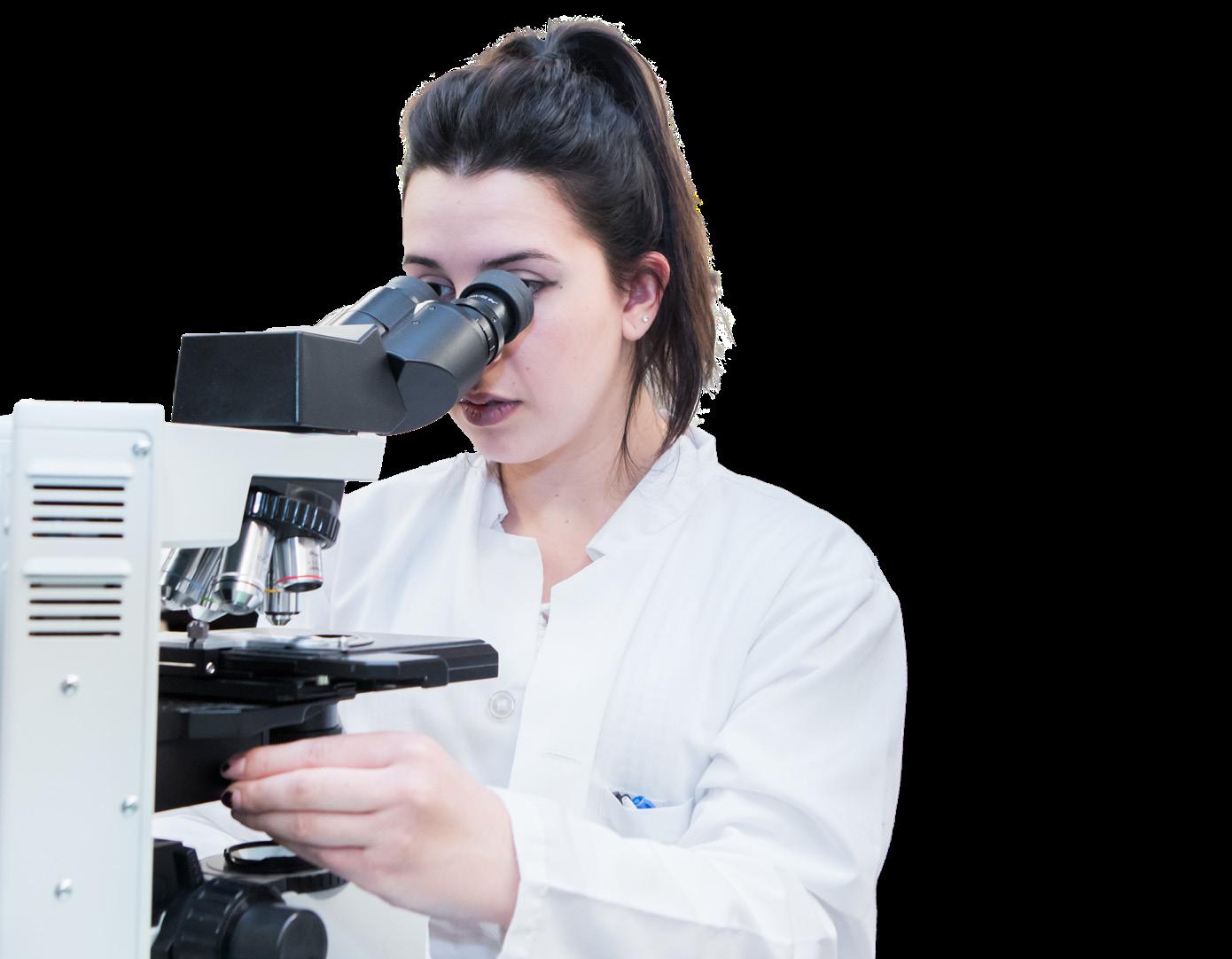
“Michener provided me with the opportunity to learn and grow in a supportive lab environment, all while providing me with the tools that I need to succeed in my career as a genetics technologist.”
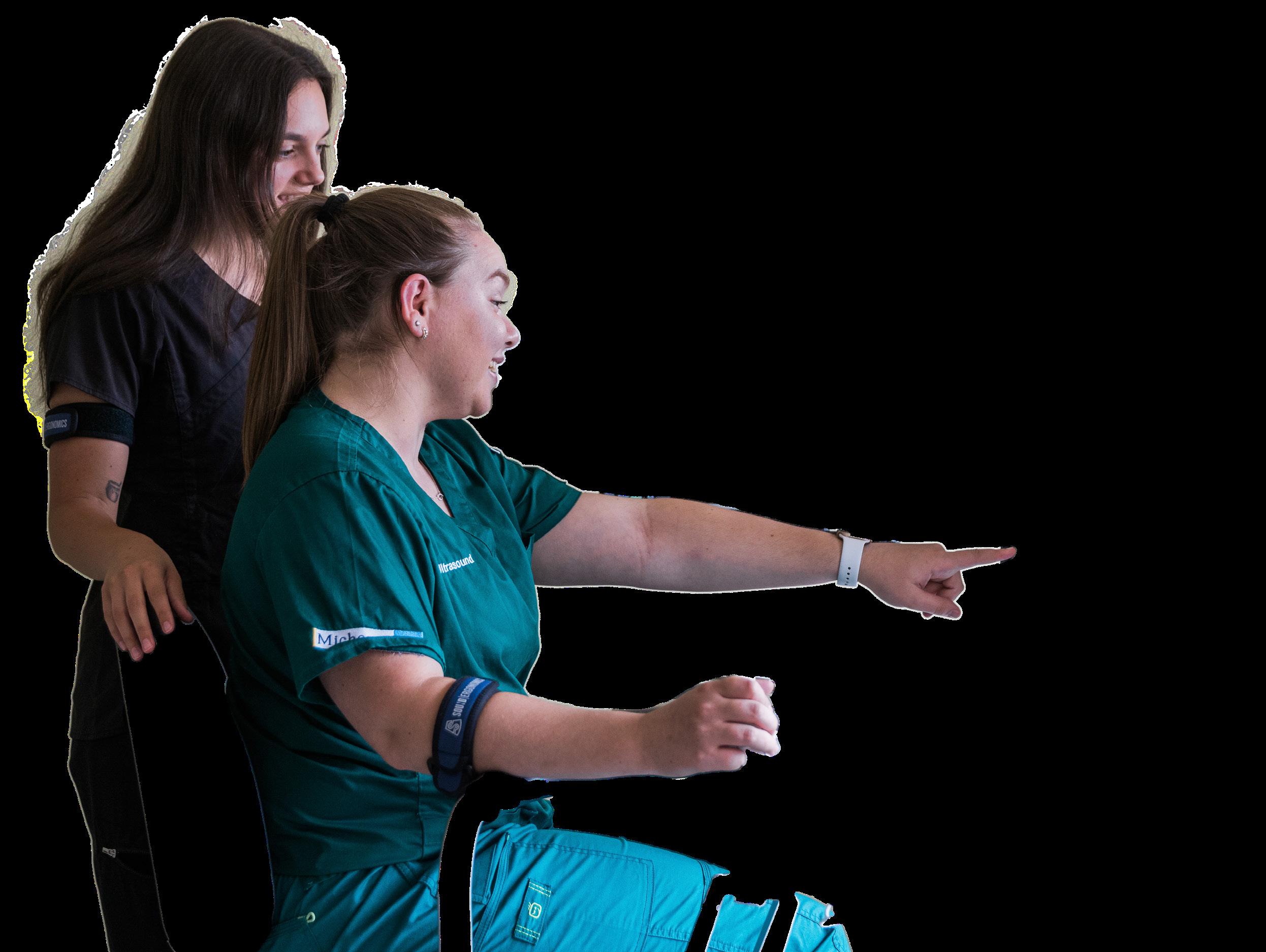
Be part of a multidisciplinary health team of medical imaging experts. As a sonographer, you’ll use ultrasound technology to examine different areas of the body to aid in the diagnosis of a variety of injuries, disease and other conditions. You’ll also play a major role in monitoring fetal development during pregnancy and assessing the viability of different types of organ transplants. Through a combination of classroom, simulation and clinical learning, this handson, patient-oriented program will provide you with the skills to provide safe, ethical, compassionate and competent care to each patient.
Through a combination of classroom, simulation and clinical learning, this hands-on, patient-oriented program will provide you with the skills to provide safe, ethical, compassionate and competent care to each patient.
Sonographers are employed in diagnostic medical imaging ultrasound departments in a variety of settings, including hospitals and independent health facilities. They may also work for government agencies, medical imaging equipment/ software sales and support, research and education. Graduates can further specialize in careers such as MRI, health informatics and management.
SAMPLE FIRST-YEAR COURSES†
Semester 1
• Ultrasound of the Abdomen I
• Cross Sectional Anatomy
• Physics of Ultrasound
• Professional Practice I
• Ultrasound Scanning I
Semester 2
• Sonographic Pathology of the Abdomen & Superficial Structures
• Obstetrics & Gynecology
• Ultrasound Scanning II
†First-year courses are subject to change.

Credential Earned Advanced Diploma
Application Deadline February 1, 2025
Program Length 2 years full-time
Program Delivery Hybrid
Start Date September 2025
Clinical Placement 30 weeks
ADMISSION REQUIREMENTS
A) Bachelor of Science degree or Bachelor of Arts/Science degree in Kinesiology with a minimum cumulative GPA (CGPA) of 3.0 on the OMSAS Scale* AND a minimum grade of 75% in each of the following university-level courses:
• Gross Human Anatomy† (1 semester-length course, 0.5 credit)
• Human Physiology† (1 semester-length course, 0.5 credit)
B) Canadian regulated healthcare professional (e.g., chiropodist, nurse, medical imaging technologist, respiratory therapist, etc.) with a minimum three-year degree or diploma in your field of study with a minimum cumulative GPA (CGPA) of 3.0 on the OMSAS* scale.
*Visit ouac.on.ca for Ontario Medical schools grade conversion. fulfills the Anatomy and Physiology requirements. OR
All applicants are required to complete the CASPer assessment. Visit michener.ca/admissions for more information. Graduates from this program may require licensure or certification to work in the profession. Visit michener.ca for more information.

“The program curriculum and the excellent instructors really helped to expand my skills and scope. I am now able to do more for my patients because I am better equipped and knowledgeable.”
Dr.

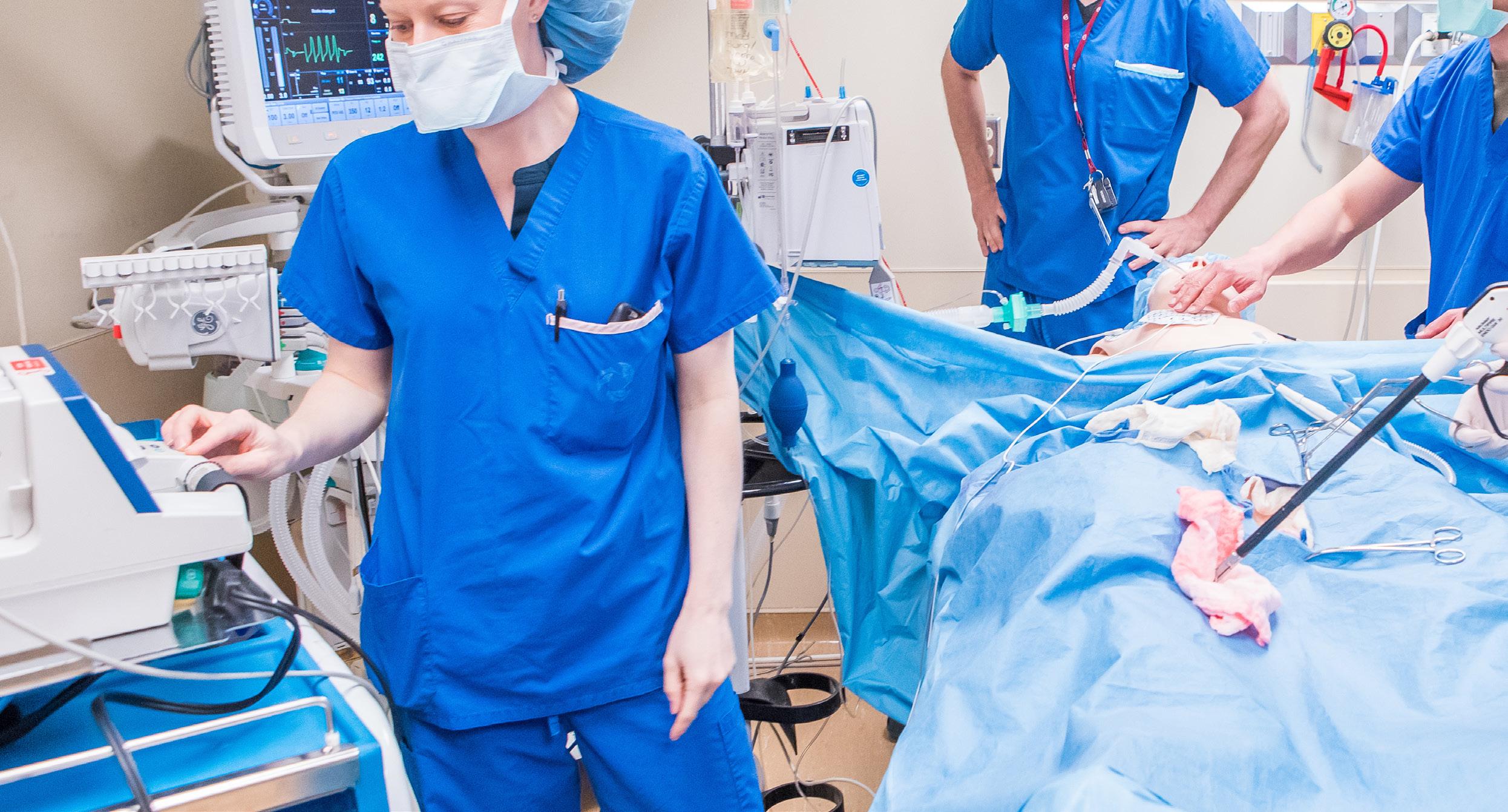
Designed specifically for practicing respiratory therapists and critical care registered nurses, this program provides specialized training for the care of stable surgical patients during general, regional, conscious, or procedural sedation anesthesia.
Made up of blocks of online and collaborative learning, residencies, simulations and a clinical placement, you’ll complete rotations in adult, pediatric, obstetrical and cardiac anesthesia. You’ll learn how to provide conscious sedation, administer anesthesia medication, monitor patients, provide technical support for anesthesiologists, and provide airway management.
Most Anesthesia Assistants work in the operating rooms of a hospital, but they can also be found in post-operative care areas, pain clinics and special procedure rooms. You can also work in dental clinics; outpatient clinics that perform diagnostic procedures requiring anesthetics; and outpatient surgical centers that perform day surgeries.
SAMPLE FIRST-YEAR COURSES†
Semester 1
• Introduction to Anesthesia
Semester 2
• General and Regional Management of Anesthesia
†First-year courses are subject to change.
Credential Earned Graduate Certificate
Application Deadline May 31, 2025
Program Length 1 year part-time
Program Delivery Online with onsite residential simulations
Start Date September 2025
Clinical Placement 12 weeks
ADMISSION REQUIREMENTS
• Registered respiratory therapist or registered nurse
• Two years or full-time equivalent (>4000 hours) of critical care experience§ within the past four years, which must include experience with therapeutic interventions related to airway management, mechanical ventilation, arterial or intravenous access, reading ECGs, providing pharmacological therapies and managing hemodynamic status, ideally in the ICU, ER, NICU or PICU environments
• Letter of support for clinical education from Chief of Anesthesia at base site
*At this time, the Anesthesia Assistant program is open to domestic students only.
Accrual of critical care experience begins after licensure. Experience accrued from in-class clinical hours will not be considered
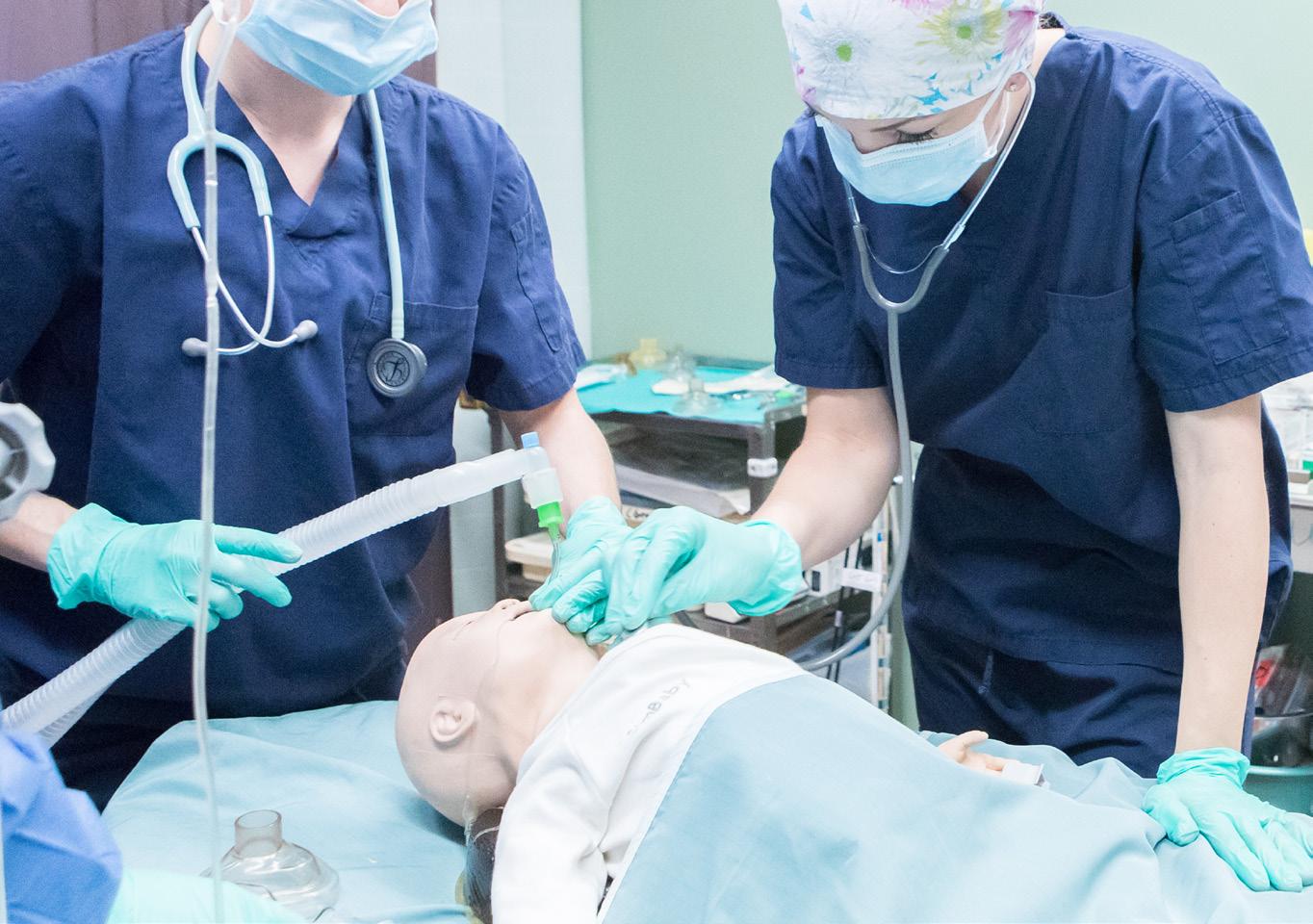
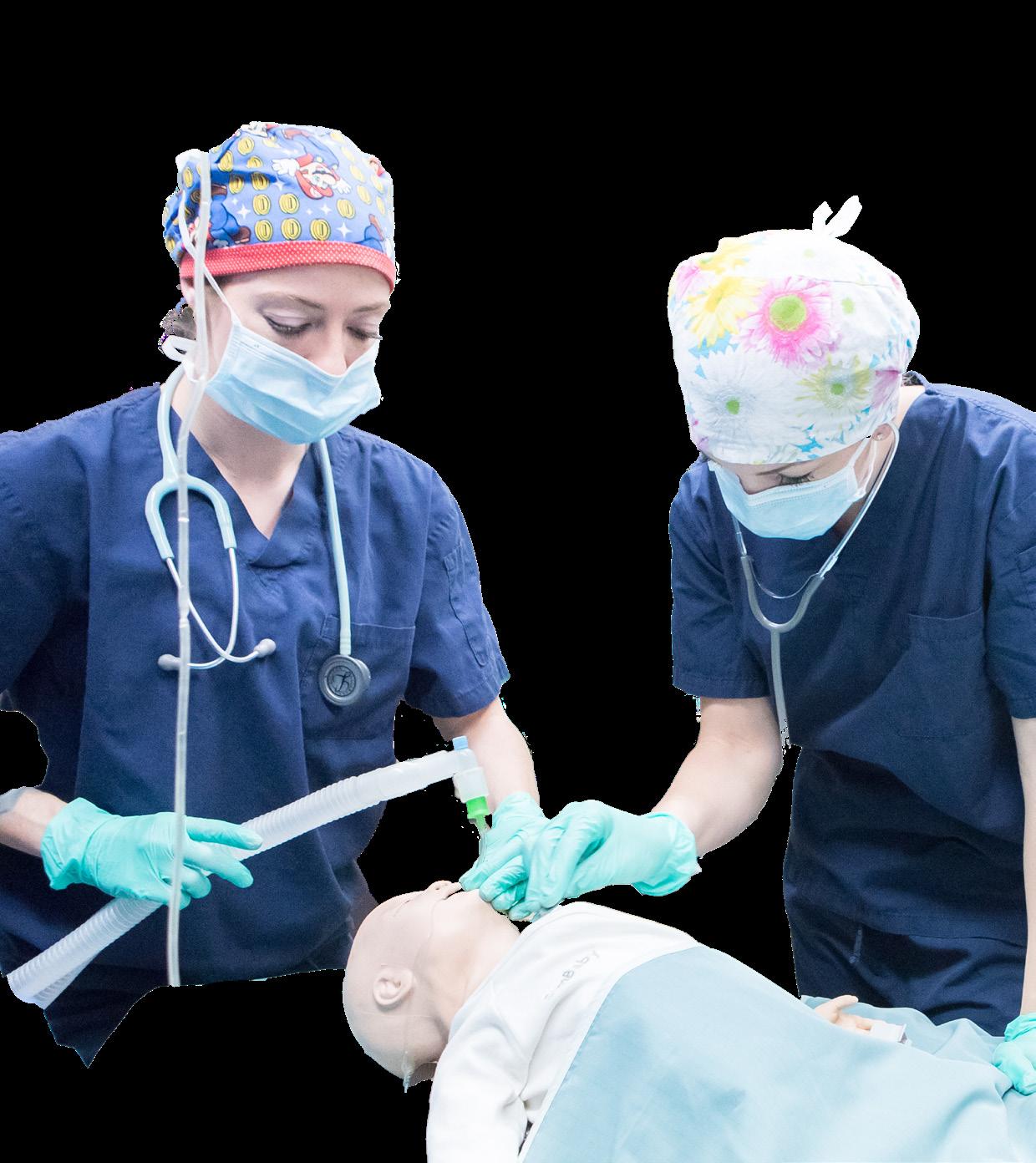
“Learning from realworld, frontline anesthesia assistants in the classroom was incredibly inspiring. It was a safe place to learn and practice before our clinical placement began.”
Valerie I. Anesthesia Assistant Student

The MRI Graduate Certificate program is a thorough, learner-focused program designed to equip you with the knowledge and skills needed to care for patients and perform MRI procedures.
In this program, you’ll gain expertise in MRI safety, patient preparation and positioning, MRI physics and methodology, cross-sectional anatomy and pathology, and the operation of advanced MRI scanners for complex imaging procedures.
Graduates may need to obtain licensure or certification to practice in the field. For more details, visit michener.ca.
MRI technologists can work in clinical environments such as hospitals, mobile magnetic resonance units and diagnostic imaging centres. Other career opportunities can be found in the areas of health informatics, digital health education, sales, applications and research. SAMPLE FIRST-YEAR COURSES†
Semester 1
• Foundations of MRI I
• Foundations of MRI II
Semester 2
• Clinical Placement
†First-year courses are subject to change.
Credential Earned Graduate Certificate
Application Deadline May 31, 2025
Program Length 8 months
Program Delivery Online
Start Date September 2025
Clinical Placement 14 weeks
ADMISSION REQUIREMENTS
Applicants must be certified or licensed as a technologist* in one of the following disciplines:
• Nuclear medicine
• Radiological technology
• Radiation therapy
• Ultrasound (Registered Diagnostic Medical Sonographer) – note that Registered Cardiac Medical Sonographer certification does not meet the admission requirements of this program
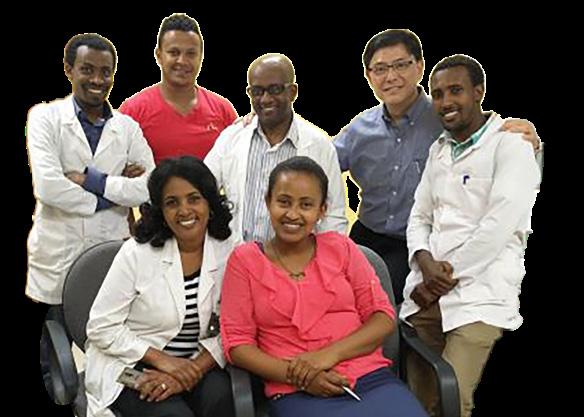

*Internationally educated and trained applicants must meet the corresponding Caqwnadian certification body requirements and should consult with:
• Canadian Association of Medical Radiation Technologists for the Internationally Educated Medical Radiation Technologist requirements; OR
• Sonography Canada’s External Candidate requirements
Michener alumni are known for their leadership, but stepping up for fellow healthcare workers halfway across the globe is exceptional, even by Michener’s high standards. Ken Pui was part of the first graduating class of Michener’s MRI program in 1999 and he now works as the MRI Charge Technologist at Scarborough Health Network. In 2016, he received a call from a colleague who was volunteering at a hospital in Addis Ababa, Ethiopia. She needed advice on an MRI machine that was donated to the hospital.
“She was asking me questions about scanning a patient, and I couldn’t just explain what she needed over the phone,” says Ken. “The next day, I booked a flight to Addis Ababa.” Ken saw an opportunity to share his knowledge not only on how to operate an MRI machine and read scans, but also on clinical readiness and communication in a healthcare team.
“I wanted to give this group knowledge that they could then pass on to their colleagues and future technologists,” says Ken.
The team learned through Ken’s images and guidelines, and used them as quick references to see what they were supposed to follow. Ken focused on the leadership skills that he gained over his career and encouraged the group to self-correct as they learned – an aspect of teaching that he learned at Michener.
A small group of technologists shadowed Ken for two weeks, and by the end of that time, the group was able to perform routine scans and examinations on their own.
When he thinks back to the lessons he learned from the experience in Addis Ababa, Ken says to never hesitate when an opportunity comes up: “I made up my mind quickly to go and support this team, and I’m so glad I did.”
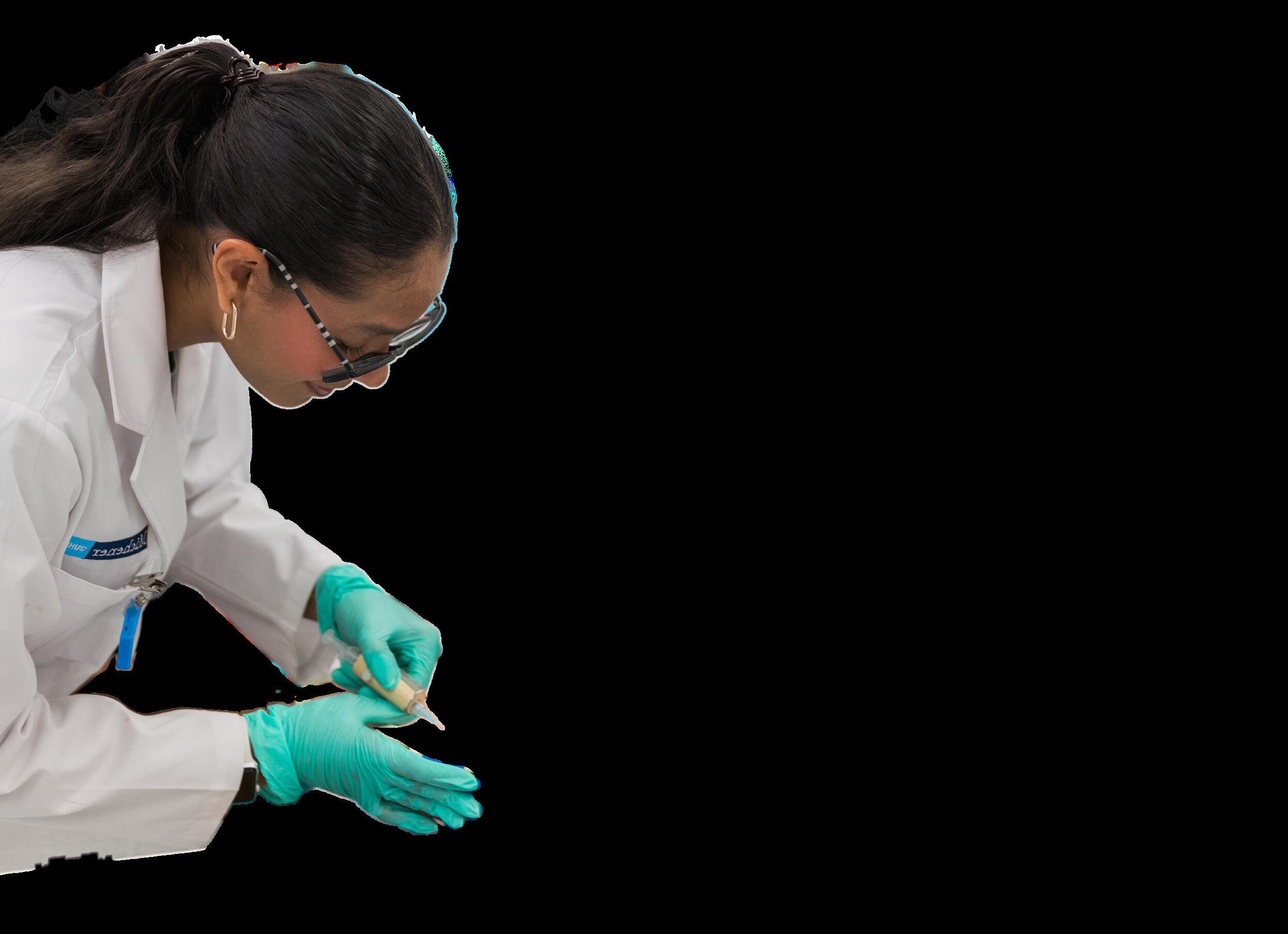
Using highly specialized cameras and radioactive tracers, this method allows for the diagnosis of specific diseases at the cellular and molecular levels. As a nuclear medicine technologist, you’ll work with some of the most advanced imaging and radioactive therapeutic technologies while delivering compassionate, and safe patient-focused care.
In this collaborative hybrid program with the University of Toronto, you’ll receive training online, in the classroom, and in Michener’s simulation labs. You’ll gain expertise in using the instrumentation, radiopharmaceuticals, and radiation safety protocols essential for performing nuclear medicine procedures in the field.
SAMPLE FIRST-YEAR COURSES
Semester 1
• Nuclear Medicine Physics and Radiobiology
• Integrated Nuclear Medicine & Molecular Imaging I
• Anatomy for Medical Radiation Sciences
• Patient Care in Medical Radiation Sciences I
• Comparative Medical Imaging
Semester 2
• Patient Care in Medical Radiation Sciences II
• Integrated Nuclear Medicine & Molecular Imaging II
• Relational Anatomy
• Physiology
Credential Earned

Bachelor of Science in Medical Radiation Sciences from the University of Toronto and Advanced Diploma from The Michener Institute of Education at UHN
Application Deadline February 1, 2025
Program Length 3 years full-time
Program Delivery Hybrid (University of Toronto's St. George Campus and Michener’s St. Patrick Campus)
Start Date September 2025
Clinical Placement 48 weeks
A minimum of one year (10 single-semester courses) of university education with a minimum cumulative GPA (CGPA) of 2.70 (B-) AND successful completion of one single-semester course in each of the following prerequisite subjects:
• Biology
• Mathematics
• Physics
• Social Science
• Grade 12 U-level Chemistry or equivalent
Graduates from this program may require licensure or certification to work in the profession. Visit michener.ca for more information.
The Nuclear Medicine & Molecular Imaging Technology program is offered jointly with the University of Toronto as part of the Medical Radiation Sciences program. Visit medicalradiationsciences.ca for more information on admission requirements, deadlines, and processes.

Graduates are employed in a variety of clinical environments including community or teaching hospitals, independent health facilities, research institutes, public health institutions, regulatory bodies, commercial radiopharmacies, education, and medical imaging equipment sales or applications.
“The program is exceptional because you gain extensive knowledge about nuclear medicine imaging, get hands on experience with gamma cameras and practice your patient care skills.”
Victoria P. Nuclear Medicine and Molecular Imaging Technology Student

Become part of an interdisciplinary team committed to treating patients with cancer. In this joint program with the University of Toronto, you’ll acquire the skills necessary to plan and deliver precise radiation treatments while also providing education and support to patients throughout their radiation therapy.
Your training will take place in simulation labs equipped with state-of-the-art technology and tools used daily in the field, ensuring you enter the clinical environment fully prepared to deliver the highest standard of patient care.
Graduates from the program find employment in cancer centres, clinical research, education, government agencies, medical equipment and software sales, support and applications. Graduates can further specialize in magnetic resonance imaging (MRI) and management.
• Introduction to Radiation Physics
• Radiobiology & Radiation Protection
• Anatomy for Medical Radiation Sciences
• Patient Care in Medical Radiation Sciences I
• Comparative Medical Imaging
• Introduction to Clinical Oncology
• Radiation Beams and Their Interactions
• Patient Care in Medical Radiation Sciences II
• Radiation Therapy Methodology I
• Relational Anatomy
• Physiology

Credential Earned
Bachelor of Science in Medical Radiation Sciences from the University of Toronto and Advanced Diploma from The Michener Institute of Education at UHN
Application Deadline February 1, 2025
Program Length 3 years full-time
Program Delivery Hybrid (University of Toronto's St. George Campus and Michener’s St. Patrick Campus)
Start Date September 2025
Clinical Placement 42 weeks
A minimum of one year (10 single-semester courses) of university education with a minimum cumulative GPA (CGPA) of 2.70 (B-) AND successful completion of one single-semester course in each of the following prerequisite subjects:
• Biology
• Mathematics
• Physics
• Social Science
Graduates from this program may require licensure or certification to work in the profession. Visit michener.ca for more information.
The Radiation Therapy program is offered jointly with the University of Toronto as part of the Medical Radiation Sciences program. Visit medicalradiationsciences.ca for more information on admission requirements, deadlines, and processes.
Sirisegaram-Cole, Radiation Therapy grad and 2011 Michener valedictorian, stands as a testament to the versatility and compassion of today’s healthcare professionals.
“In a field where technology evolves rapidly and techniques undergo frequent transformations, adaptability is paramount,” says Abby. “You cannot be stagnant, you must continuously push boundaries, consider innovative approaches and incorporate advancements to enhance efficiency,” she says, “with our key focus on the highest standard of care for our patients.”
As Interim Clinical Specialist Radiation Therapist (CSRT) at the Royal Victoria Regional Health Centre (RVH) in Barrie, Abby played a crucial role in the patient journey when they present urgently with advanced cancers that require expedited triaging and care.
She credits Michener with placing an emphasis on interprofessional collaboration, staying current with technology and fostering a culture of continuous learning.
“The supportive staff at Michener created a space where asking questions was not just welcomed but crucial for bridging the gap between textbook knowledge and practical application,” she says.
Abby also touts the importance of emotional support – especially for vulnerable patients – and remains steadfast on the necessity of tailored care.
In a heartfelt poem titled, “Treat You Like My Own,” she creatively explored her lived experience during her mother’s cancer journey in the midst of the pandemic. She also participated in the ‘I Belong Here’ campaign at RVH to champion the importance of diversity, equity and inclusion in healthcare settings.
Abby says she feels incredibly privileged to be in her role. “When patients undergo radiation there is a lot of trust involved, and it can be incredibly scary for them,” she says. “For me, it is important to remain grateful for that trust and my continued ability to provide high quality cancer care close to home.”

Radiological technologists play a crucial role in detecting injuries and diseases, from imaging broken bones to offering visual guidance during surgery, using advanced radiographic technology.
In this joint program with the University of Toronto, you’ll gain hands-on experience with a wide range of onsite tools, including X-ray, Computed Tomography (CT), and operating room equipment within a simulated environment. Before starting your clinical placement, you’ll develop the technical expertise, critical-thinking, and problem-solving skills needed to perform and adapt radiological procedures to meet each patient’s medical needs.
Graduates are employed in a variety of areas including hospitals and independent health facilities, government agencies, medical imaging equipment and software sales and support, new product development and education. Graduates can further specialize in magnetic resonance imaging (MRI), ultrasound, health informatics and management.
• Anatomy for Medical Radiation Sciences
• Human Osteology
• Comparative Medical Imaging
• Patient Care in Medical Radiation Sciences I
• Diagnostic Imaging Instrumentation I
• Radiographic Physics and Radiobiology
Semester 2
• Relational Anatomy
• Patient Care in Medical Radiation Sciences II
• Physiology
• Diagnostic Imaging Instrumentation II
• Radiographic Procedures I
Credential Earned

Bachelor of Science in Medical Radiation Sciences from the University of Toronto and Advanced Diploma from The Michener Institute of Education at UHN
Application Deadline February 1, 2025
Program Length 3 years full-time
Program Delivery Hybrid (University of Toronto's St. George Campus and Michener’s St. Patrick Campus)
Start Date September 2025
Clinical Placement 42 weeks
ADMISSION REQUIREMENTS
A minimum of one year (10 single-semester courses) of university education with a minimum cumulative GPA (CGPA) of 2.70 (B-) AND successful completion of one single-semester course in each of the following prerequisite subjects:
• Biology
• Mathematics
• Physics
• Social Science
Graduates from this program may require licensure or certification to work in the profession. Visit michener.ca for more information. The Radiological Technology program is offered jointly with the University of Toronto as part of the Medical Radiation Sciences program. for more information on admission requirements, deadlines, and processes.
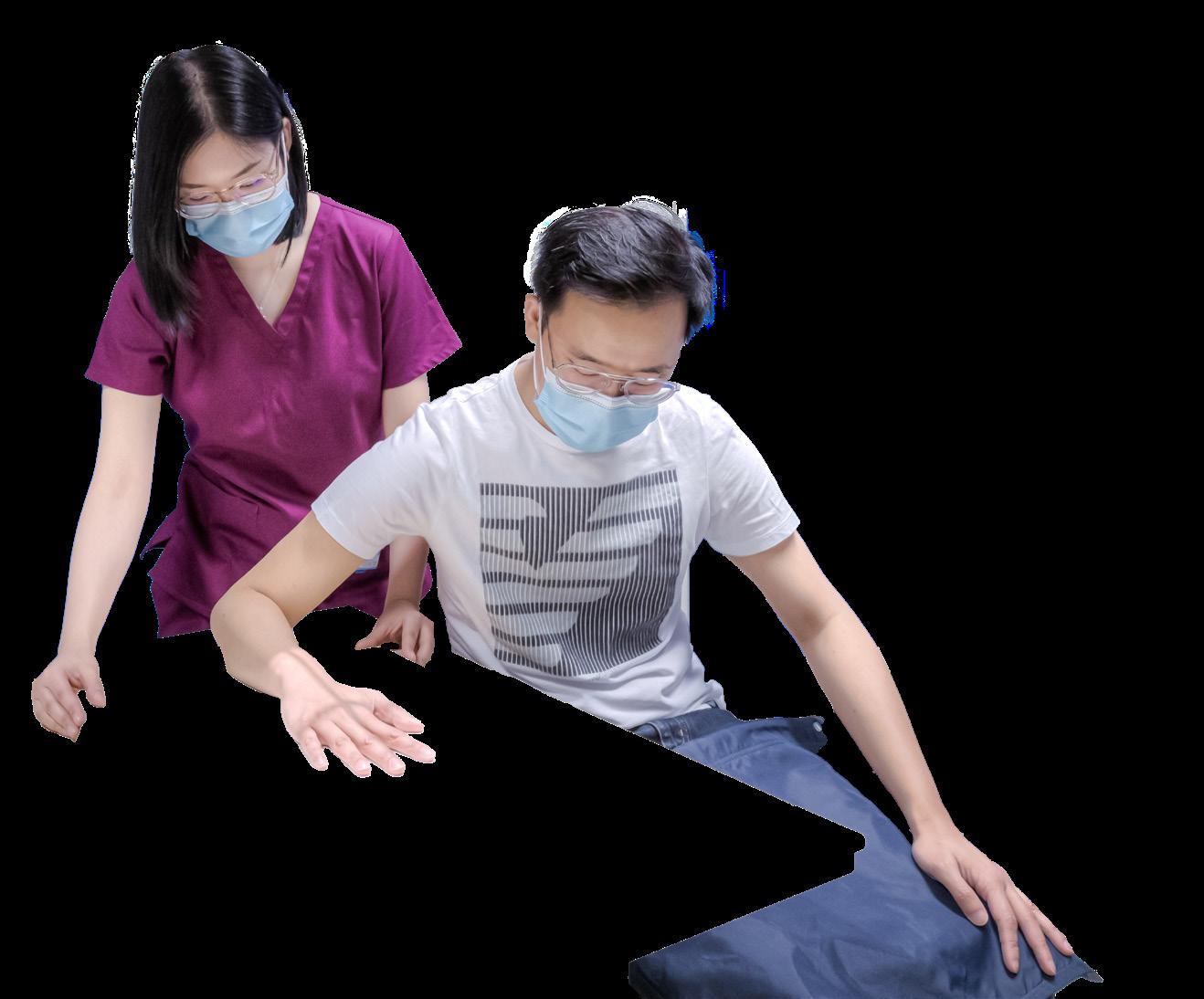
“There are a lot of technological advancements happening right now, tech is merging even further with the health-care field. There’s so much to learn, with even more coming up in the future. That makes this such a great place to be!”
Emmanuel F. Radiological Technology student
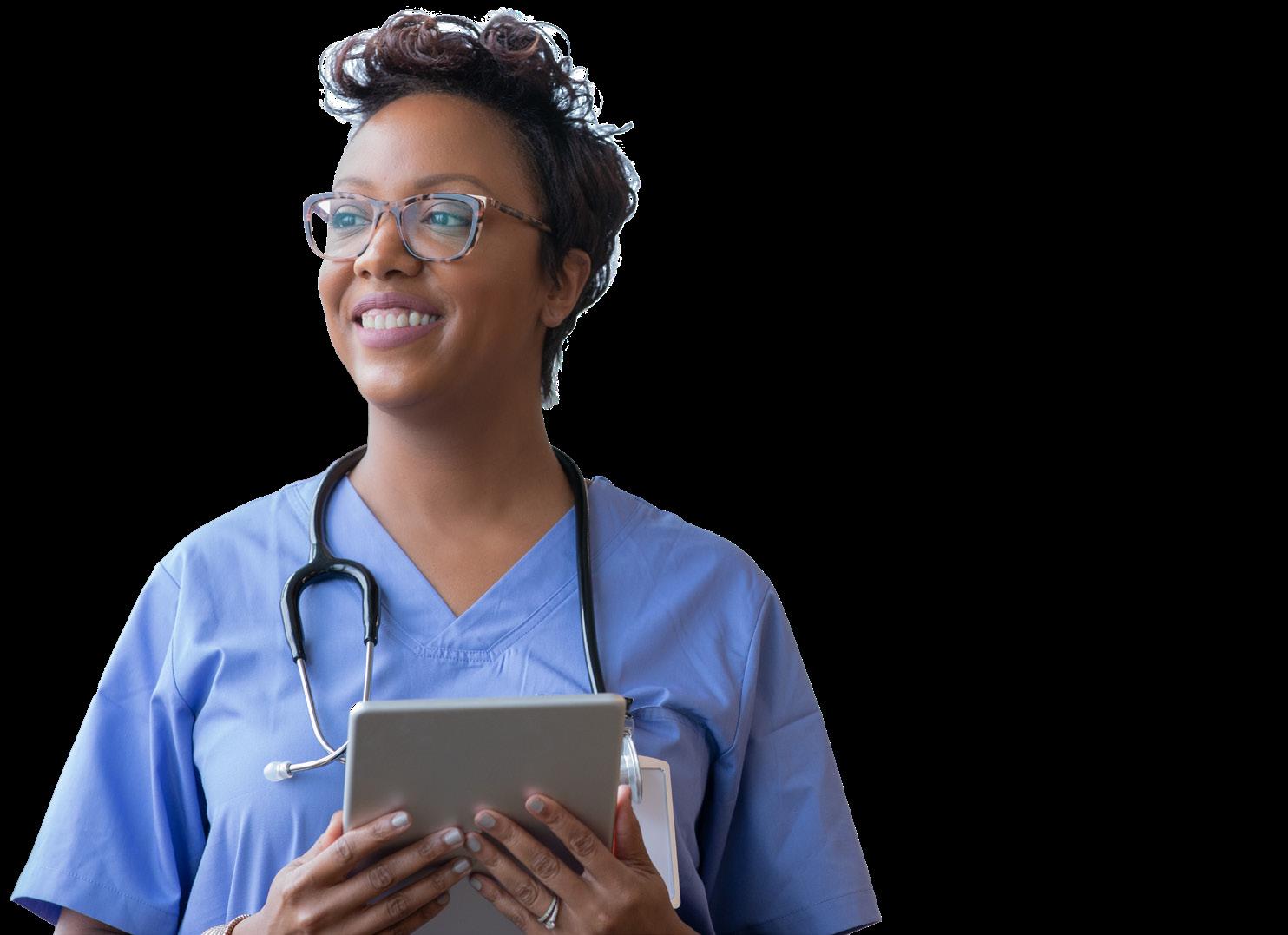
Continuing Education at The Michener Institute offers options for lifelong career development and learning in dozens of health professions. Whether you want to enhance your qualifications or brush up on a new skill, Michener offers specialty courses, workshops, certificate programs and micro credentials to meet the needs of the healthcare system — and your career goals.
AP807
Gross Human Anatomy and Physiology
AP601 Anatomy and Physiology for Healthcare Professionals
HGCE110
Human Genetics
Our continuing education and professional development programs are designed so you can participate online anywhere, anytime throughout your healthcare career. Visit michener.ca/ce or email ce@michener.ca to learn more about all available certificate programs, courses, workshops and micro credentials.
The course begins with an introduction to the human body and the basic cell. It will then follow a systemic approach where different systems will be covered as separate modules.
Learn at your own pace to complete the required assignments, mid-term and final examination within one year of registering for the course. Designed to satisfy both the gross human anatomy and human physiology admission requirements for the full-time Ultrasound and Cardiovascular Perfusion programs
An introductory anatomy and physiology course for healthcare practitioners, internationally educated healthcare practitioners and those interested in anatomy and physiology.
Satisfies prerequisite requirements for Michener’s full-time Diagnostic Cytology program
An introductory course in human genetics for healthcare practitioners, internationally trained healthcare practitioners and those interested in developing careers in human/medical genetics.
A final grade of at least 70% in this course will satisfy the human genetics prerequisite requirement for Michener’s full-time Genetics Technology program
MGCE110
Molecular Genetics
This is an introductory course in molecular genetics for healthcare practitioners, internationally trained healthcare practitioners and those interested in developing careers in human/medical genetics.
A final grade of at least 70% in this course is required to meet the molecular genetics prerequisite for Michener’s Genetics Technology program

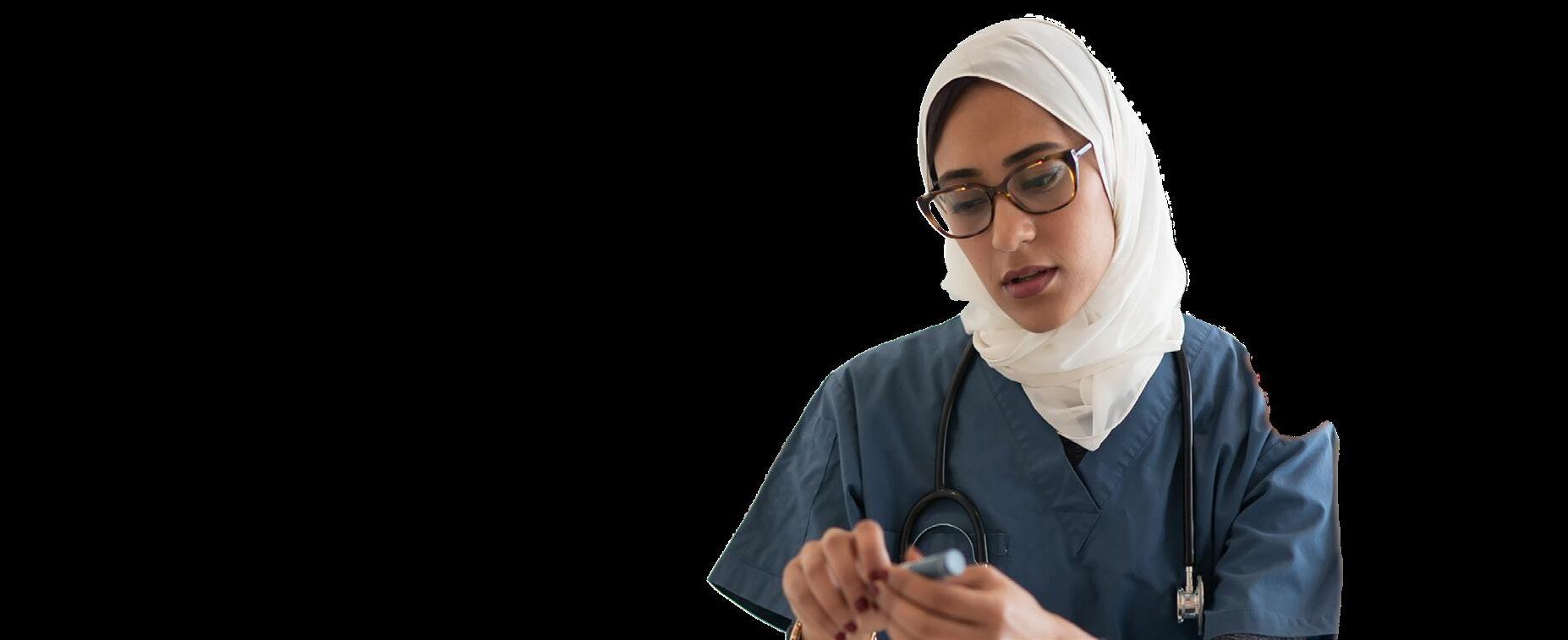
The Michener English Language Assessment (MELA) is a standardized English language proficiency test specific to the healthcare sector. This test is referenced to the Canadian Language Benchmarks (CLB).
MELA scores are used for admission to all Michener full-time, part-time and bridging programs as a diagnostic tool by program consultants and for regulatory licensing.
The test takes about three and a half hours, split into four sections:
• Speaking (20 minutes)
• Listening (60 minutes)
• Reading (60 minutes)
• Writing (60 minutes)
MELA assessments take place in-person at The Michener Institute. For more information on the MELA process visit michener.ca/MELA For general inquiries email mela@michener.ca
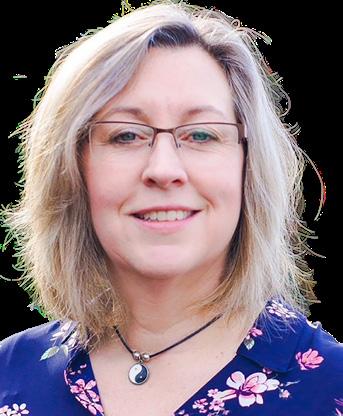
Michener’s bridging programs and courses are designed for experienced internationally educated health professionals (IEHPs) who wish to practice as licensed healthcare professionals in Canada. They are designed to help ‘bridge the gap’ by:
• Preparing IEHPs for their certification exams and integration into their profession’s regulatory college
• Preparing IEHPs with information about entry and integration into the Canadian healthcare workplace
• Medical Laboratory Science Hybrid program
• Radiological Technology (X-Ray) Hybrid program
• Ultrasound Scanning Evaluation In-person, hands-on course
All bridging programs and courses are offered in the evenings and on weekends.
For more information on application dates, admission requirements and funding, visit michener.ca/bridging or email bridging@michener.ca.
Shauna
Prouten, a Registered Dietitian of over 30 years, spent most of her career as a dietitian in psychiatry and long-term care in Alberta. but then moved to Vancouver Island to work in acute, long-term and community care.
It was her new employer at Island Health on Vancouver Island who first encouraged her to look into the Diabetes Educator Certificate Program at The Michener Institute of Education at UHN.
“The program is well-established and well-set up,” says Shauna. “I valued the different ways that Michener engages their learners –the written, audio and video components, as well as group chats with classmates.”
“These are all great ways to pull people in, get them talking to one another and networking,” she says.
After doing her own research on the program, Shauna believed it would provide a strong foundation in diabetes management – an area she had not specialized in over her career. While
continuing to work full-time as a nutrition practitioner, she began the continuing education program in January 2022.
From a classroom perspective, Shauna says the instructors were accessible and open to answering questions between sessions and appreciated that the program was adult-education focused. She also enjoyed the integrative team approach to learning about diabetes management, and that she was able to gain different perspectives from her classmates.
After completing the program in the summer of 2022, Shauna says the education she gained helped build capacity in her position. “I feel it is very helpful to have the knowledge I have now, after taking this Michener program, to add to my practice in the community. I am seeing more people with diabetes now and having the knowledge and resources to share with them is great.”
“I would highly recommend it, it’s an excellent program,” says Shauna. “The reality is that Michener brings to the table a really client-centred approach and an adult-education perspective on how to teach peoples – which is much better than just reviewing practice guidelines.”


Visit Michener.ca for program information and admission requirements. Attend our info sessions starting October 2024 to learn more about the programs through our faculty and students.
Applications open in OCAS or Michener Self-Service* in October 2024.
Application Deadlines
• Full-Time: February 1, 2025
• Part-Time: May 31, 2025
* Applications to the Cardiovascular Perfusion program must be submitted via Michener Self-Service
Make sure to complete all requirements by the Document Submission Deadlines
• Full-Time: February 15, 2025
• Part-Time: June 7, 2025
Last CASPer Test Date
• February 20, 2025
Offers of Admission are released based on timelines below:
• Full-Time: March – April 2025
• Part-Time: June – July 2025
Acceptance Deadline
• May 31, 2025
Accepted students must read their acceptance letter carefully to fulfill any conditions and post-admission requirements by below dates:
• Full-Time Provisional Offer Deadline: July 15, 2025
• Part-Time Provisional Offer Deadline: July 31, 2025
• Health Requirements Deadline: July – August 31, 2025

Applications are assessed and ranked based on cumulative GPA, computer-based assessment for sampling personal characteristics (CASPer) and an applicant experience checklist, if applicable. The chance of receiving an offer of admission increases when an applicant scores high across all selection criteria. Visit michener.ca/admissions-requirements for more information.
Do I need to have clinical experience to be eligible for admission? If so, how much clinical experience is required?
Clinical experience is not a prerequisite requirement for admission to Michener’s full-time programs. Some Michener programs have an applicant experience checklist, where points can be obtained by having clinical experience. For more information on the applicant experience checklists, visit michener.ca/supportingdocuments.
Can I still apply if I have not finished my degree or a prerequisite course required for admission?
It is possible to be in the process of completing prerequisite(s) while applying. Should you apply, we would require proof of enrollment into any outstanding prerequisite(s) by the document submission deadline, February 15, 2025.
Can college courses be used for prerequisite fulfillment?
College courses can be used for the Magnetic Resonance Imaging (MRI) First Discipline, Medical Laboratory Science, Respiratory Therapy and Digital Health and Data Analytics programs.
Where can I do my clinical placement? Is it paid or unpaid?
Clinical placements are unpaid. The selection is based on a lottery system. Students are placed in affiliated clinical sites that include teaching and community hospitals, private clinics, and home care providers across Canada.
I am an internationally educated applicant, what documents should I submit?
Internationally educated applicants must meet all program requirements and prerequisites. Applicants must have their official transcripts evaluated by World Education Services (WES) or International Credential Assessment Service of Canada (ICAS). Proof of English language proficiency must be submitted. Visit michener.ca/internationally-educatedapplicants for additional information.
What can I expect from the CASPer test? How do I register?
CASPer is an open-response, situational judgement test that evaluates aspects of your social intelligence and professionalism such as ethics, empathy, problem-solving and collaboration. The test requires both video and typed responses. Depending on the program you have applied for, the test takes about 90 to 110 minutes to complete. Applicants who are invited to take part in the CASPer assessment must register via Acuity Insights at acuityinsights. app/dates-times as early as possible as slots are limited.

Michener welcomes applicants from all over the world. Come join us in the heart of the hospital district in downtown Toronto to experience our top-of-the-line education. No matter where you reside in the world, Michener is happy to welcome you to our campus!
An international applicant is an applicant who does not hold a Canadian Citizen or Permanent Resident status in Canada. Internationally educated applicants who are Canadian citizens or Permanent residents are considered Domestic Applicants.
International applicants and domestic applicants who are internationally educated must submit the following requirements for admissions. Applications are submitted via OCAS or Michener Self-Service for Cardiovascular Perfusion program. Refer to the previous page for admission deadlines or go to michener.ca for more details.
ENGLISH
Michener English Language Assessment (MELA) 8.0 in each band
Test of English as a Foreign Language (TOEFL)* TOEFL iBT and TOEFL Home Edition 600 Paper or 100 IBT (22 on writing section)
International English Language Testing System (IELTS) *– Academic IELTS One skill retake not admissible
6.5 Overall and 6.0 on each band
Pearson Test of English (PTE) – Academic 65 Overall and 60 in each communicative skill
*All scores must be achieved on a single test date.
English Proficiency requirement may be waived if you satisfy one of the following criteria:
a. A registered or licensed Canadian Healthcare provider
b. Studied at least two (2) consecutive years of full-time post-secondary education in a university or college in Canada.
c. Completed 2 years full-time post-secondary education in a country where the dominant language is English (listed on michener.ca)


Credential assessment is required to validate the equivalency of your international credential. Michener requires a course-by-course or comprehensive evaluation of credentials for admissions. Visit Michener.ca for more information.
International Credential Assessment Service (ICAS)
Secondary & Post-Secondary transcripts
World Education Services (WES) University transcripts

Comprehensive evaluation
Course-by-Course evaluation
Recommended for high school transcript evaluations
Does not provide course-by-course evaluation for high school transcripts
OrnellaAkeza’s path to become a registered Medical Radiation Technologist is marked by her determination and dedication.
“The journey has been long, but I’m very proud of what I’ve accomplished,” says Ornella. “I’m happy that I am able to wake up every day and go to a job that I love, and where I can help others.”
Originally from Burundi, Ornella spent 17 years in South Africa before she graduated from Durban University of Technology with a background in medicine, ultrasound and medical radiological technology.
Following a one-year internship, Ornella and her family relocated to Ottawa to pursue additional clinical training to fulfill her ambitions. The transition to Canada posed challenges as she struggled to find employment in her field. She even attempted the CAMRT certification exam for licensure without success.
“I found it very challenging to do the exam without the up-to-date knowledge and having the Canadian exposure to standardized education,” she says. Through the Ottawa Community Immigrant Services Organization she was introduced to a Medical Radiation Technologist mentor, who encouraged her to apply to Michener’s Bridging Program in Radiological Technology.
Ornella was accepted in 2023 and learned new concepts such as patient positioning, anatomy, pathologies and advanced X-ray instruments. She praises the program’s lecturers and curriculum, and says it contributed to her confidence and knowledge to work in Canada. Today, she is a registered Medical Radiation Technologist at an Ottawa clinic. She stresses the value of the program for any internationally educated healthcare professional looking to bridge knowledge gaps and build their confidence to succeed in Canada’s healthcare environment.
Ornella’s advice to newcomers is to take it one step at a time. “Make a plan, organize your goals and work towards where you want to be – in the next three, five and even ten years.”
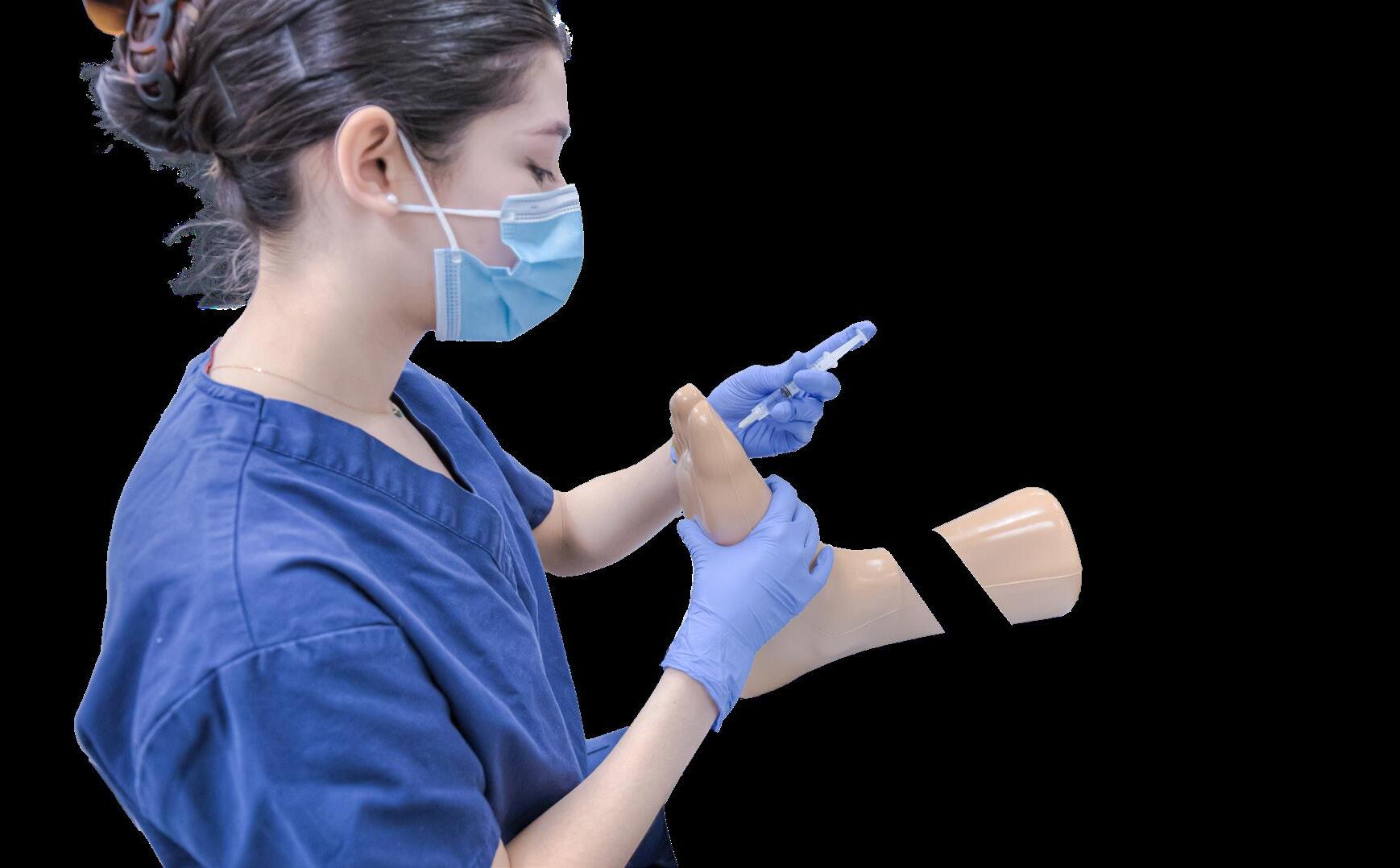
Fees are based on the average 2024/2025 tuition and mandatory fees.
Actual fees vary per program and are subject to change.
*Mandatory fees for Advanced Diploma and Master’s Degree programs include Student Health and Dental Insurance plans.
†The above fee estimates are not applicable to joint programs with University of Toronto. Visit medicalradiationsciences.ca for more information.
Textbooks
Supplies, uniforms and equipment
Cost per year
$200 - $2,400
$80 - $3,042
Professional exam fees† $1,015 - $3,800
Some programs require students to purchase disposable lab coats or other lab equipment. Clinical sites may also require students to wear uniforms.
Most Michener students will be required to write a professional exam after program completion. Licensure fees vary and are non-refundable.
†The professional exam fee is a one-time fee paid by the student to the regulatory body.
‡International students pay the same amount for books, supplies, equipment, and uniform.
Gennaccaro always knew she wanted to help people in their moment of need, but it wasn’t until she found The Michener Institute that her path became clear. It’s a journey that has led her to her future career, and to being awarded the 2024 Dr. Diana Michener Schatz Scholarship.
Recounting past aspirations, Julia smiles as she describes her original plan to enter forensic sciences. “It turns out I didn’t have the stomach for it,” she says with a laugh. “But I still knew I wanted to do something to help people.”
After completing a degree in molecular biology and genetics at the University of Guelph, Julia entered the healthcare workforce as a research assistant with Hamilton Health Sciences. While she valued her experiences in clinical research and found fulfillment in helping others, she wanted deeper personal interactions that were lacking in the role.
“I found with my research there was less work with people directly,” she says. “I had
to learn the hard way that it wasn’t for me.”
Looking into Michener she discovered the field of nuclear medicine, and as they say the rest is history. The program led her to work in hospitals across the city through an externship and placement, and to the Schatz Scholarship award.
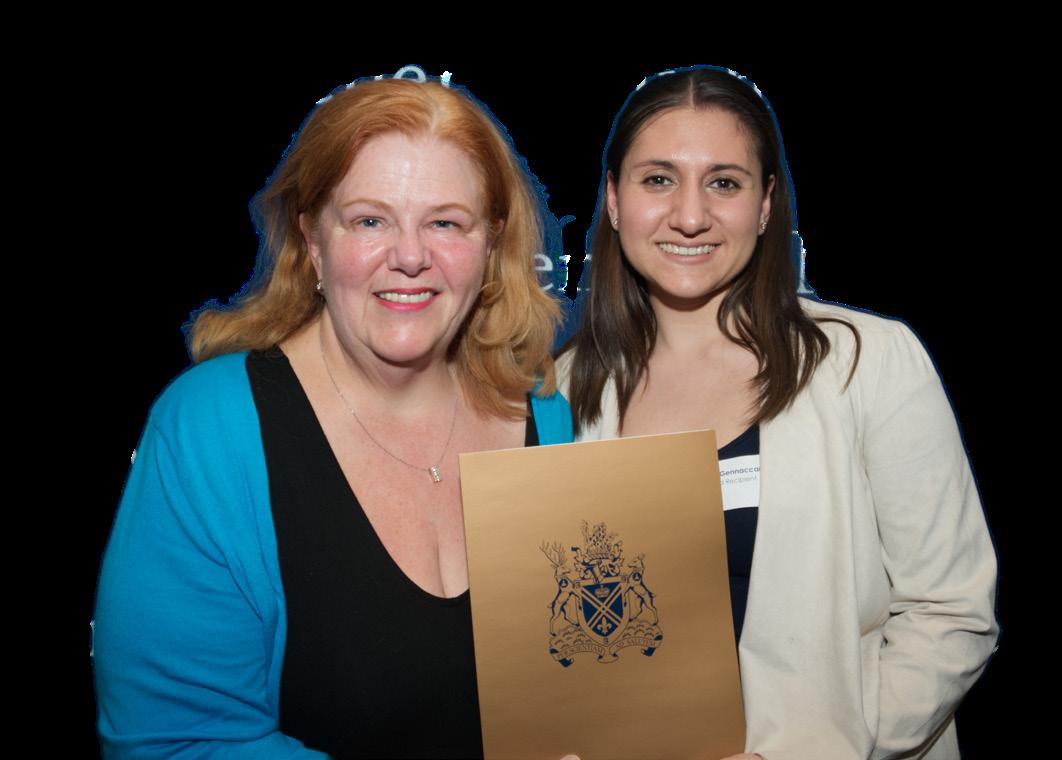
It was a recognition Julia did not expect to receive. “I was a little shocked and overwhelmed when I got the email,” she says. “To be recognized for an award named after Dr. Schatz is such an honour.”
Established in 1996 in honour of the founder and former president of The Michener Institute, the award distinguishes a student in the midst of a career transition who achieves academic excellence, displays innovative thinking and contributes to the Michener community.
Julia says the recognition is another example of the supportive nature at
Michener offers more than 70 scholarships and awards to students who embody academic, clinical and other healthcare-related excellence.
Full-time students with demonstrated financial need may apply for a general bursary. Applications are open twice per year, in the fall/winter and summer semesters.
With clinical placements located throughout Canada, the Clinical Relocation Bursary is available to help cover the costs of a significant move for a clinical placement. Students who need to relocate 50km or more for their clinical placement, and who have demonstrated financial need, are eligible.
Michener. “Some days can be tough, so it’s really nice to know we have people rooting for us to succeed.”
She began her career as a Nuclear Medicine Technologist with St. Joseph’s Hospital in Hamilton following graduation, and she did so with confidence. “Because the program is so specific and the courses are tailored so well, you’re ready to get out into the work environment by the time you’re done,” she says.
“It’s a guiding route that leaves you wellprepared by the time you graduate.”
Most of Michener’s full-time programs are eligible for OSAP. Residents of Ontario may apply for government-funded loans and grants through OSAP. Contact the Financial Aid Officer at regoffice@ michener.ca if you need assistance.
For students looking to enrich their personal and professional experiences beyond the classroom, the Student Professional Development Grant provides financial support for students to present at or attend a conference, represent Michener at an academic competition, or volunteer, among other activities.
Students can apply for part-time jobs with various departments across the Michener campus. Connect with the Student Success Network at success@michener.ca for more information. Visit

What’s coming up
Meet our faculty, students and admissions team at the next event for prospective students. Find out more about our programs, tour the campus and have your questions answered.
Ontario College Fair
October 16-17, 2024 • Enercare Centre Hall B
Exhibition Place, Toronto
Student Life Expo
October 27, 2024 • Metro Toronto Convention Centre
Michener Webinar Series
November 4, 11, 18 and 25, 2024
Michener Fall Open House
November 23, 2024
Michener Information Sessions
Join these one-hour sessions between September 2024 and January 2025 to learn more about Michener programs, services and admission requirements and process. Visit michener.ca/program-information for more information.
Michener comes to you
Check out the Fairs & School Visits calendar at michener. ca/highschool-university-visits and get in touch if you have any questions.

AskMI Drop-in Sessions
Need help with your application? Stop by one of our AskMI Drop-In sessions.
To register, visit michener.ca/admissions/contact-us
TheMichenerInstitute MichenerInst
